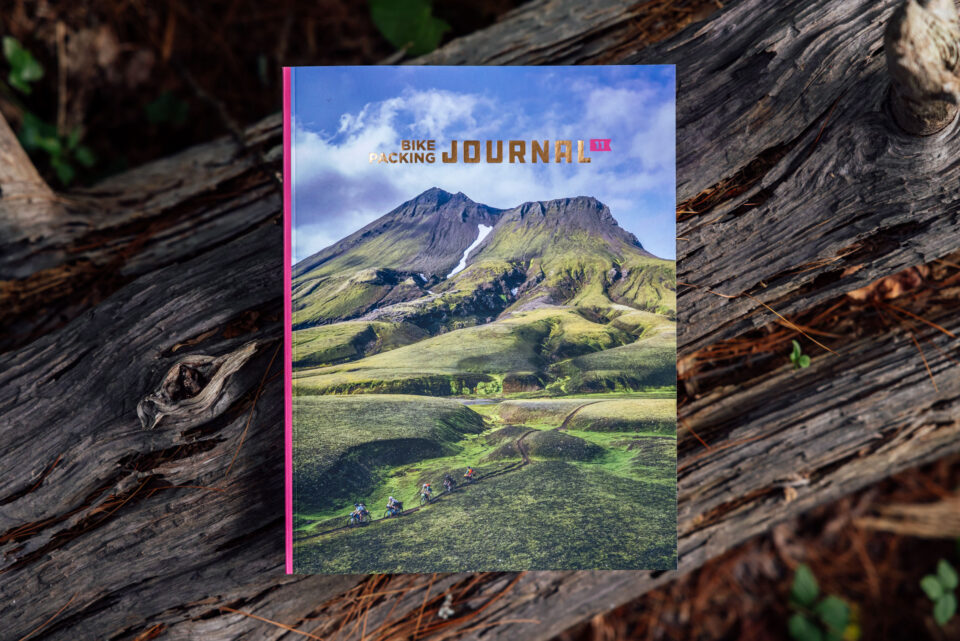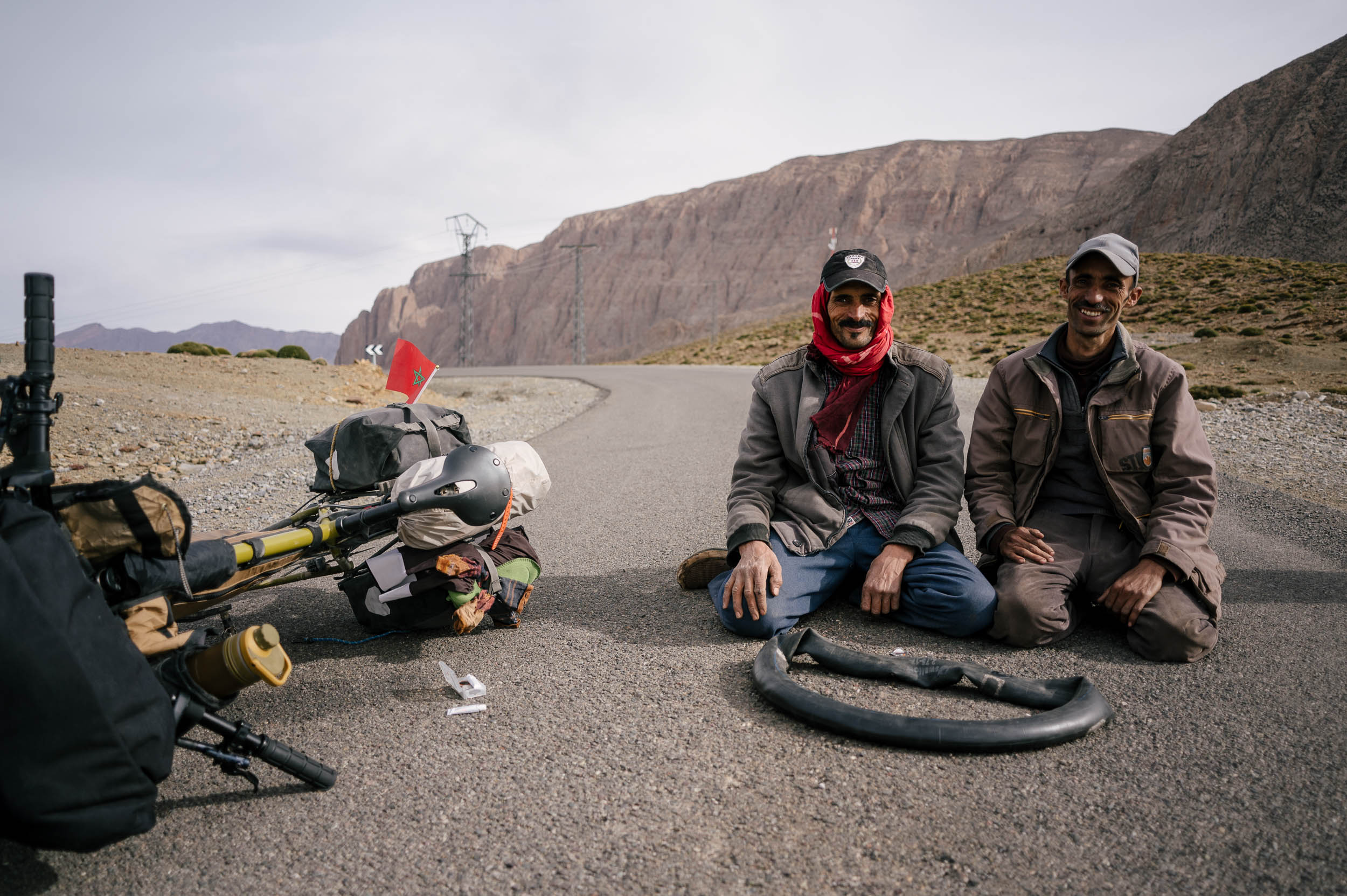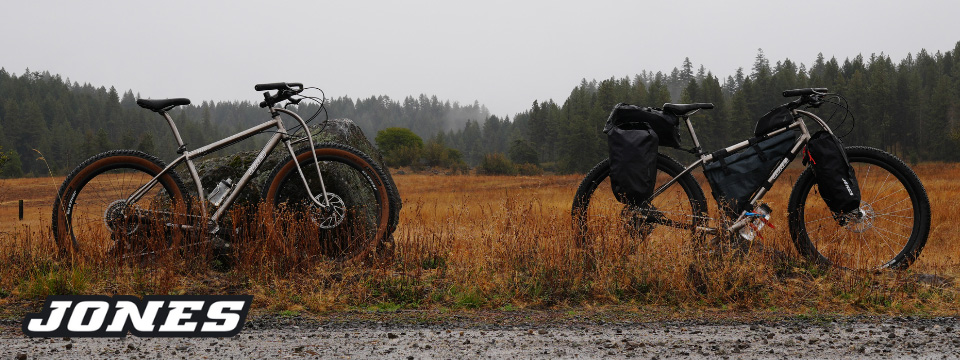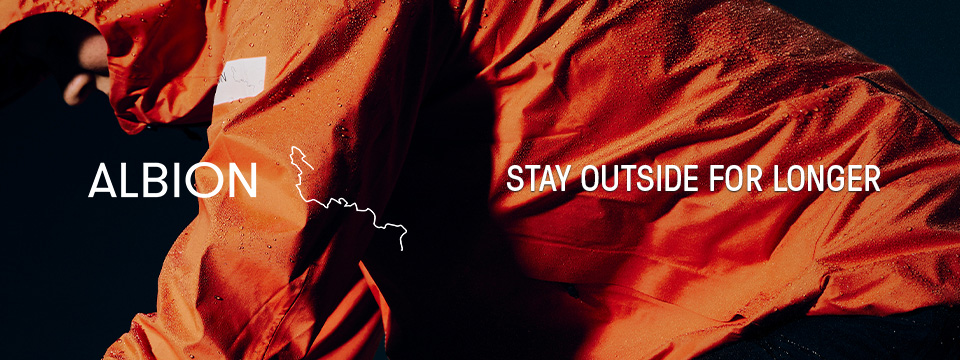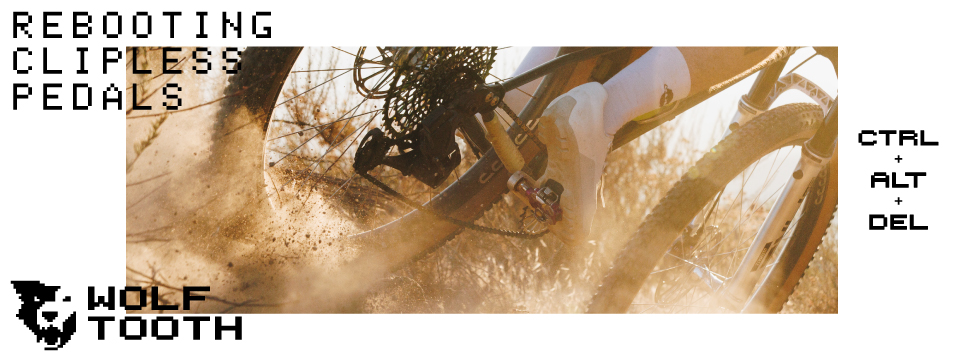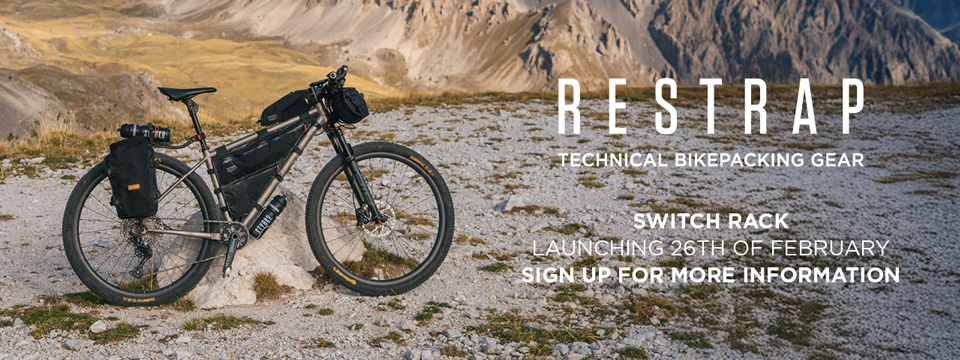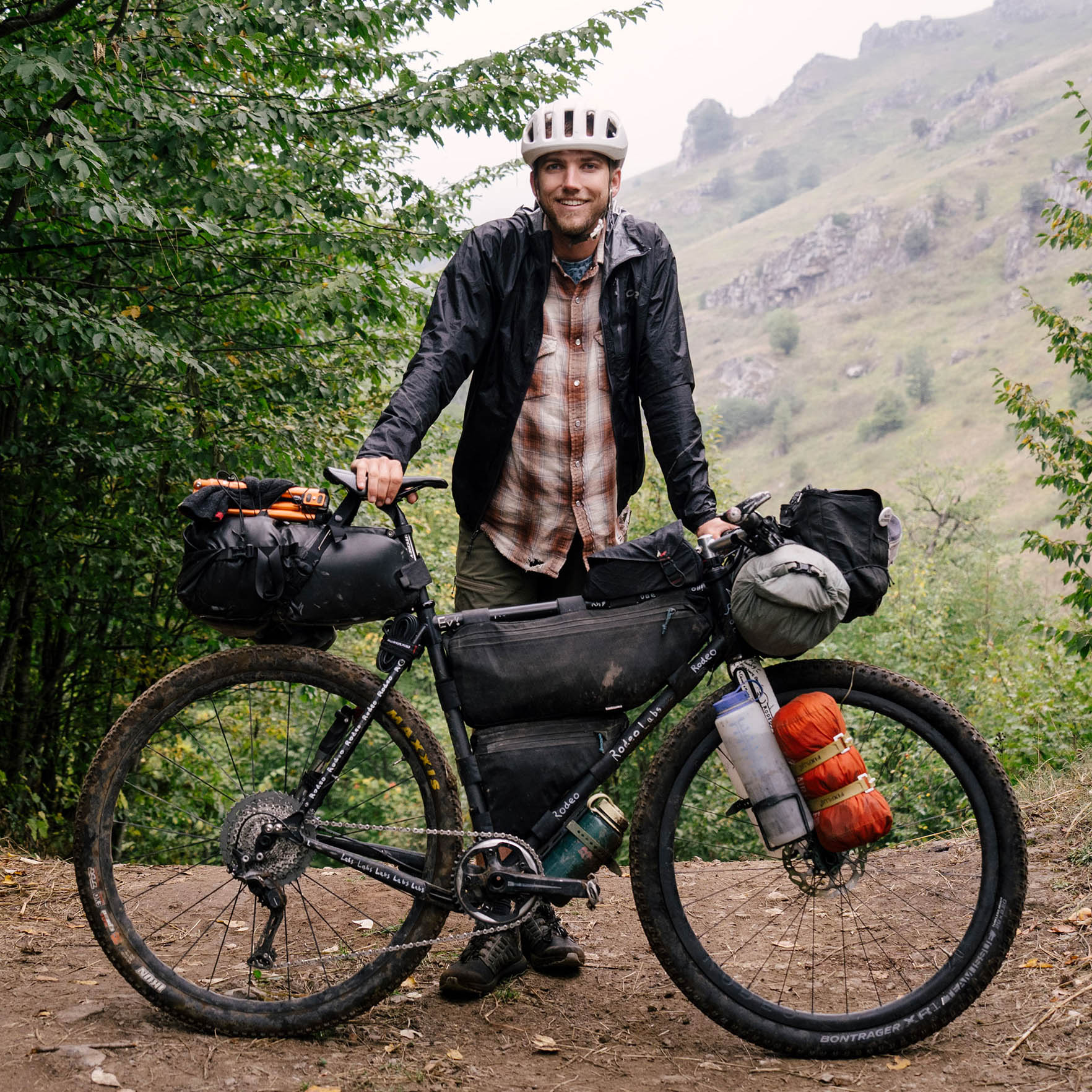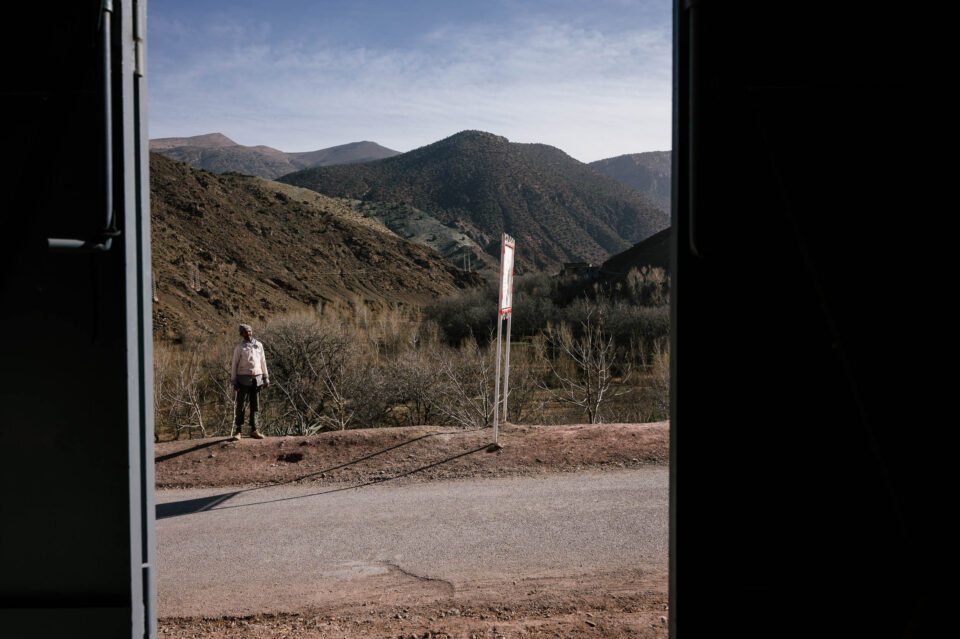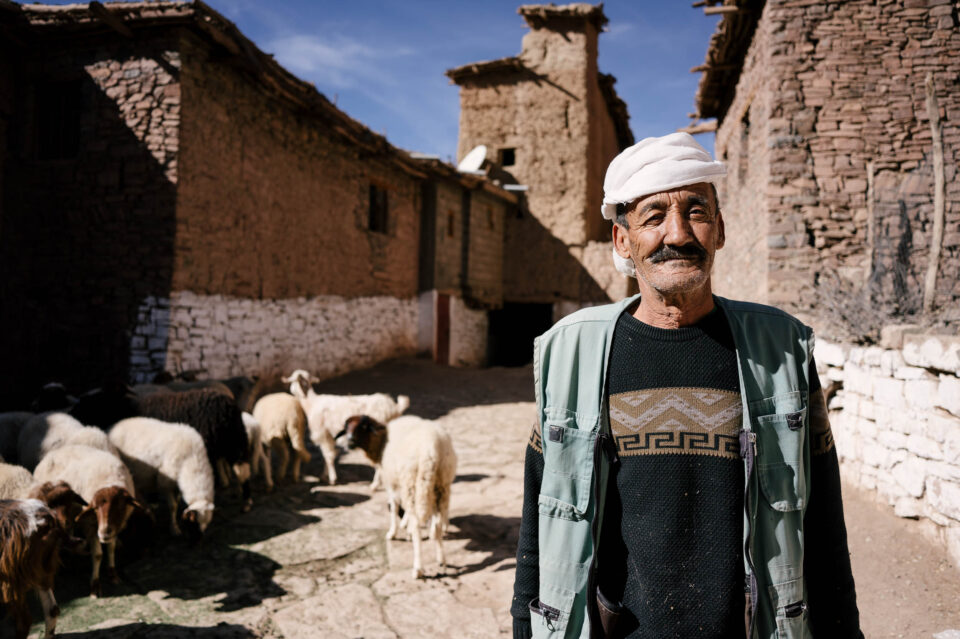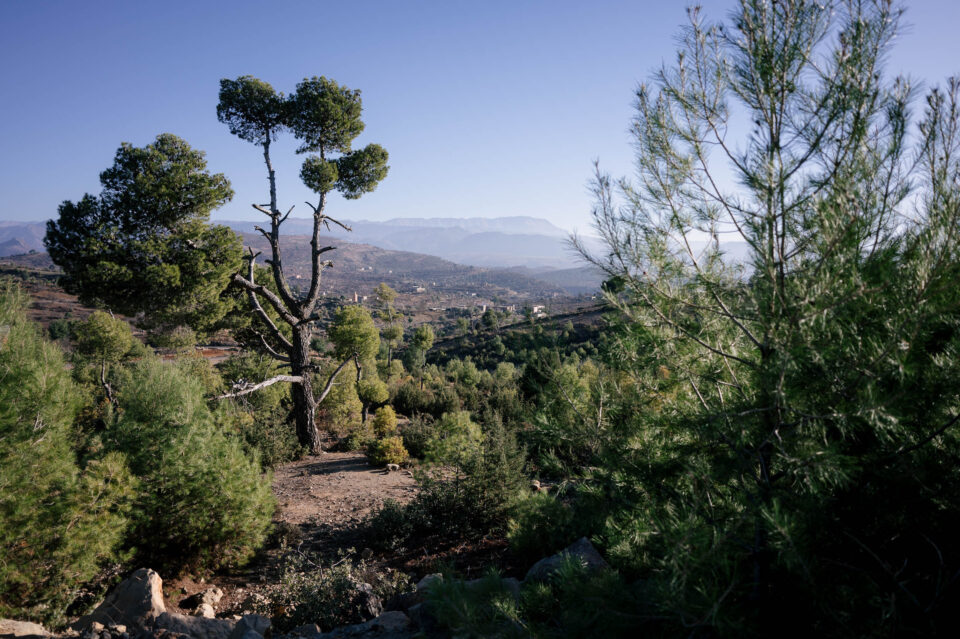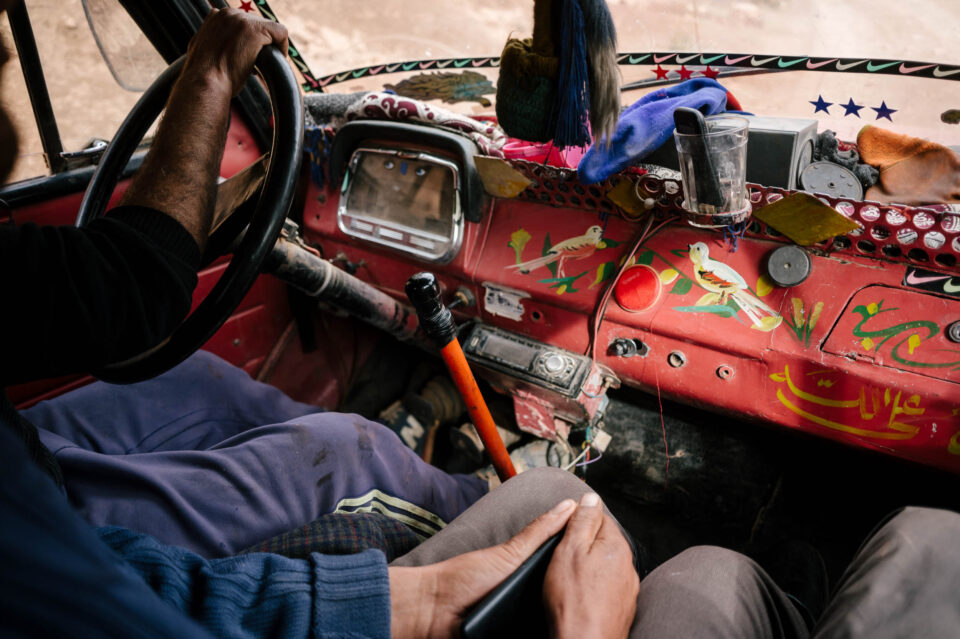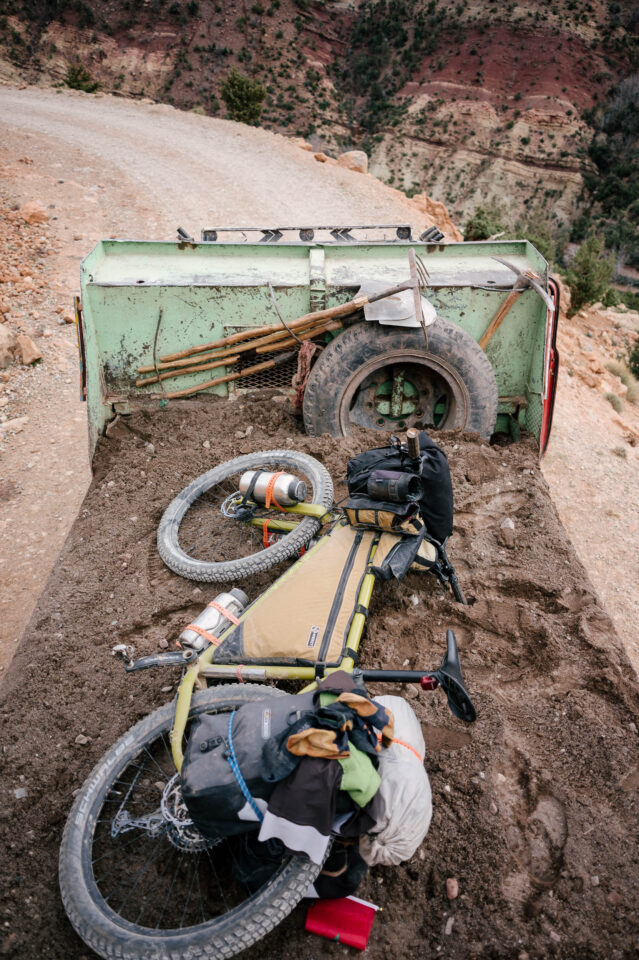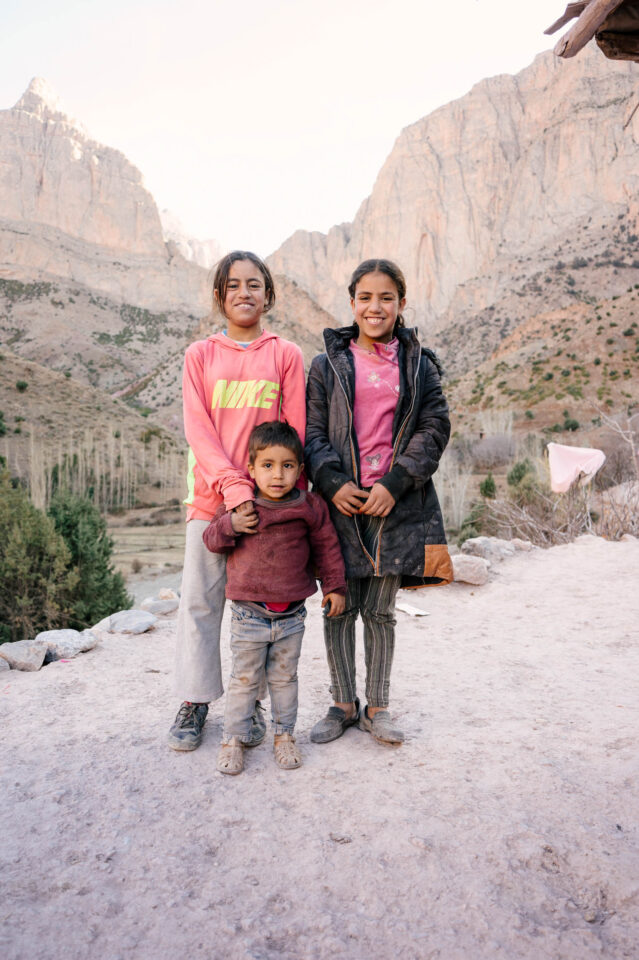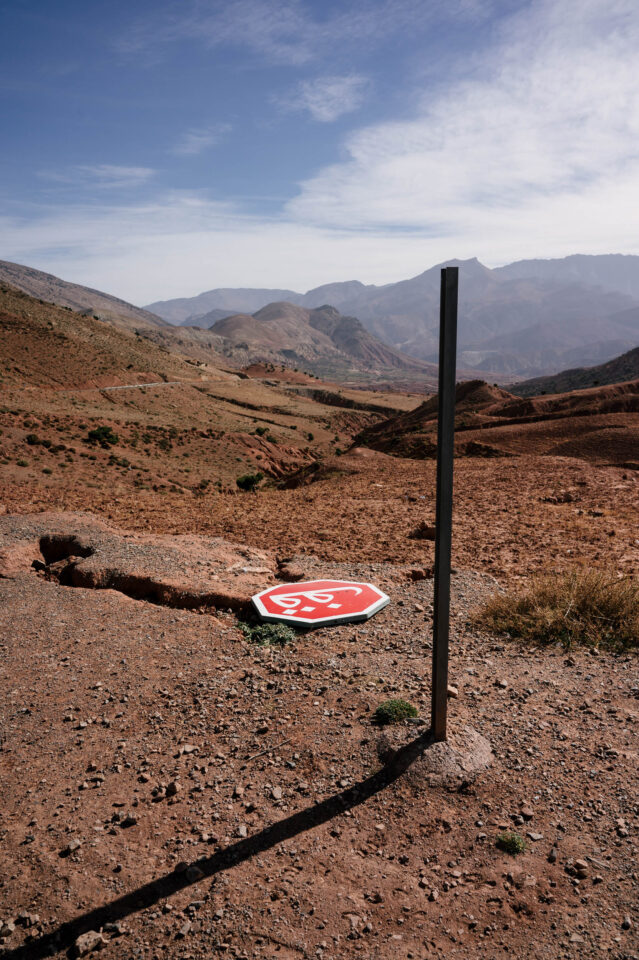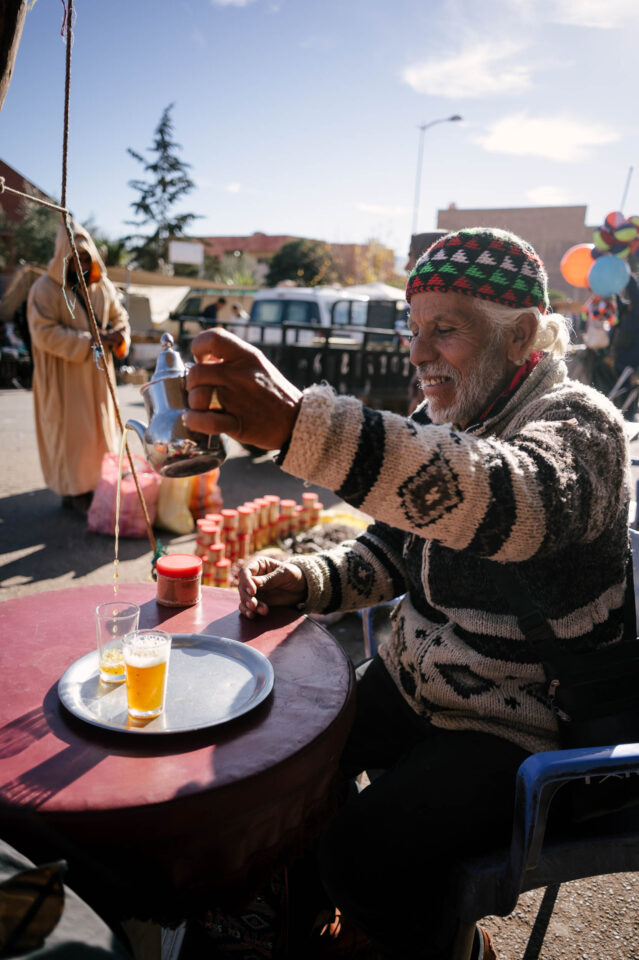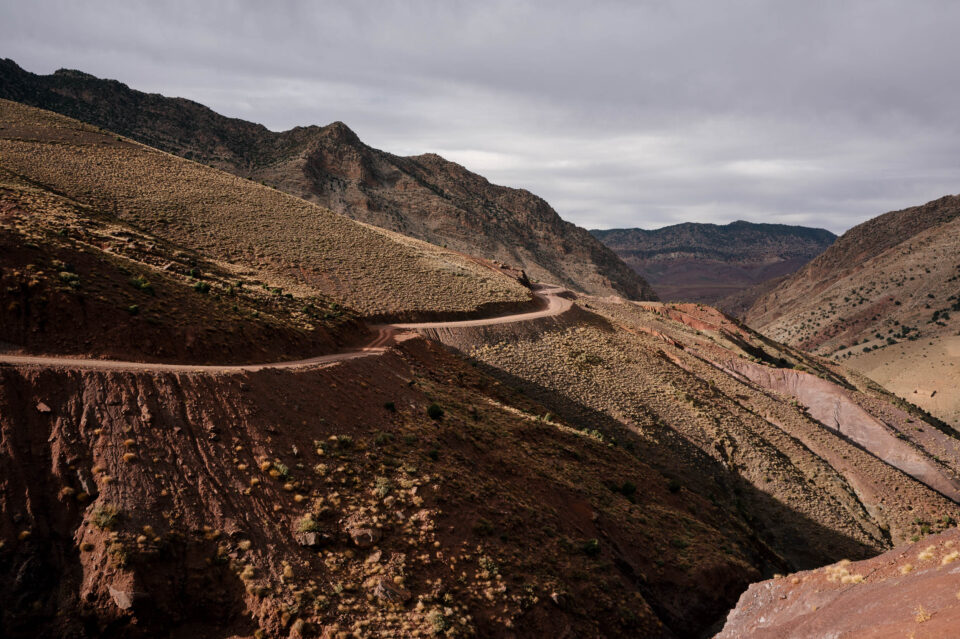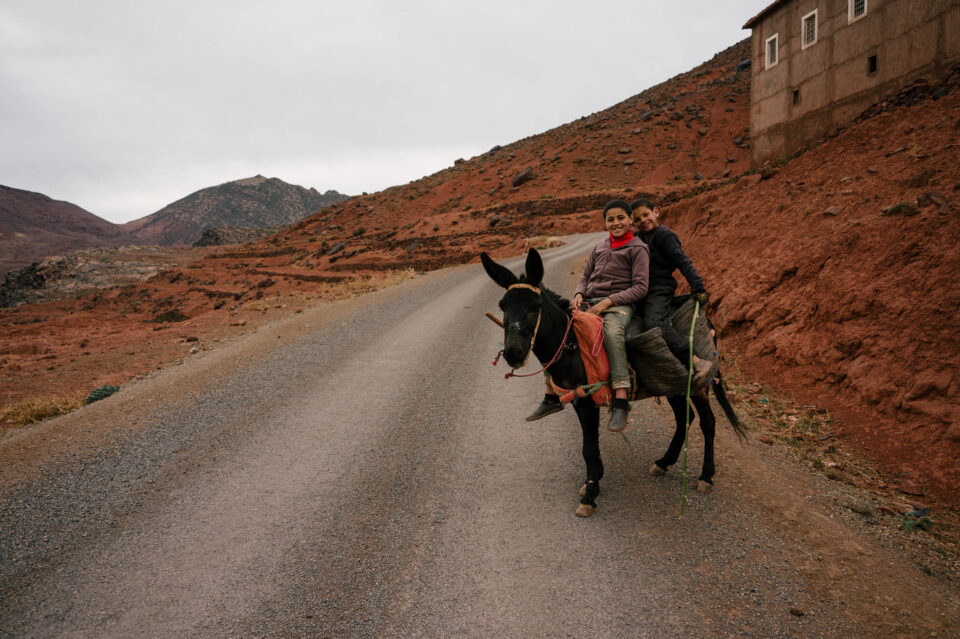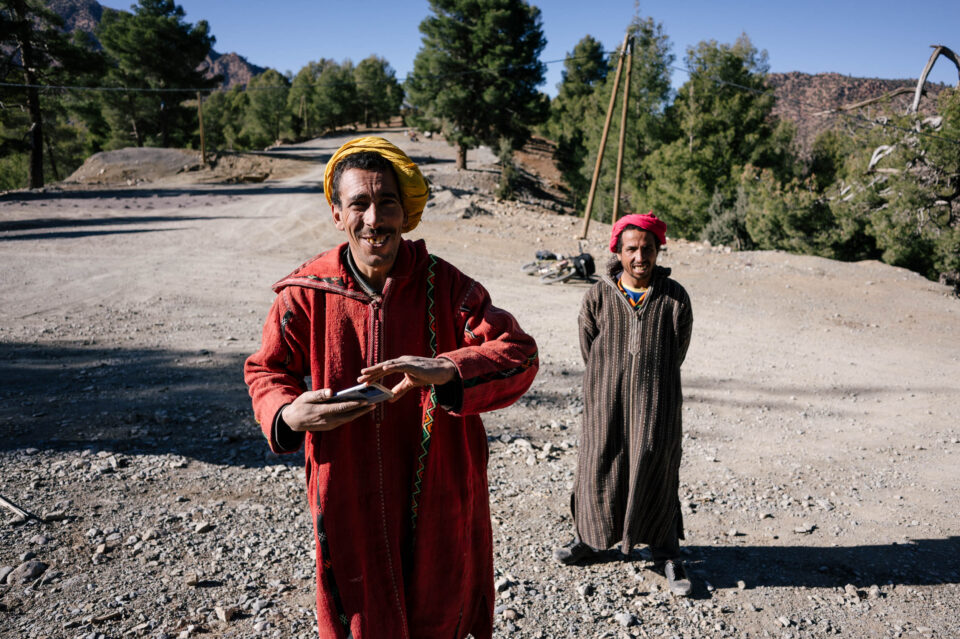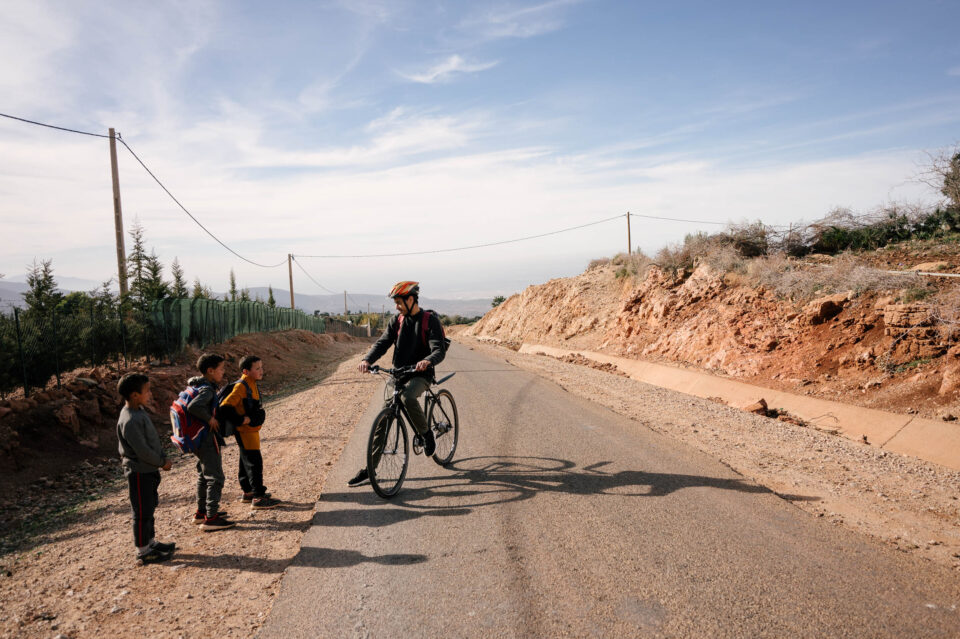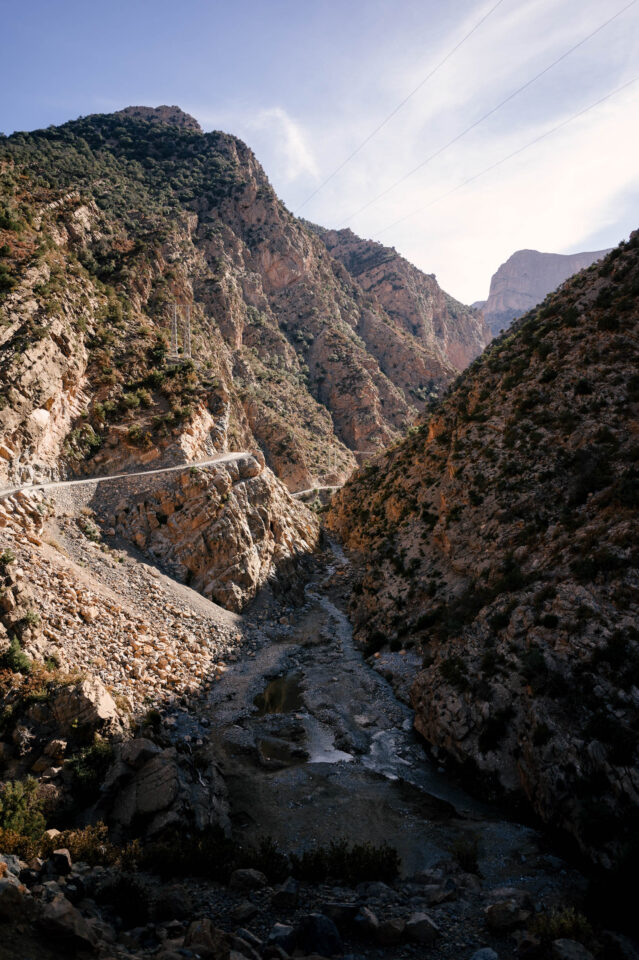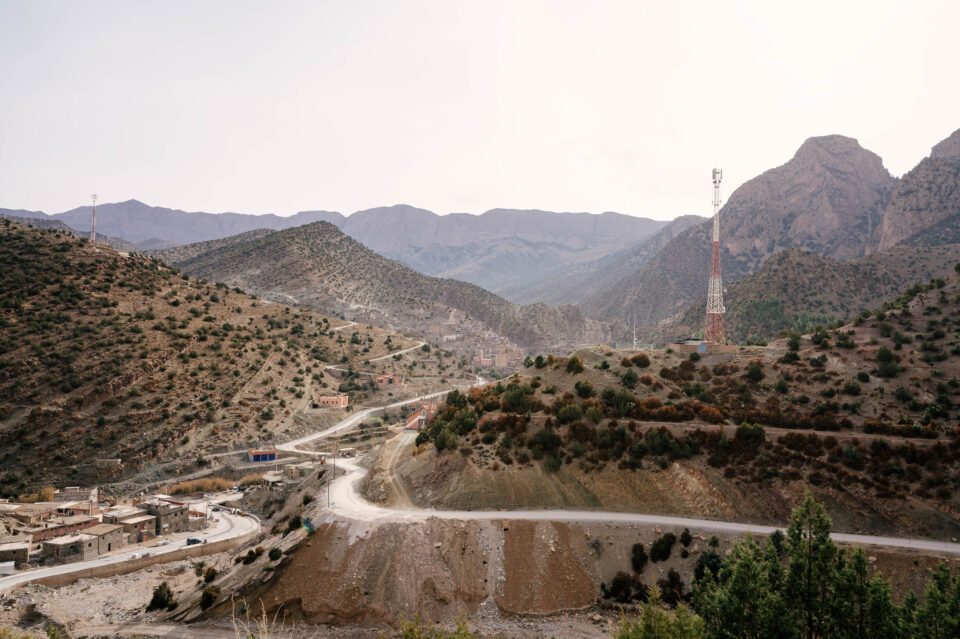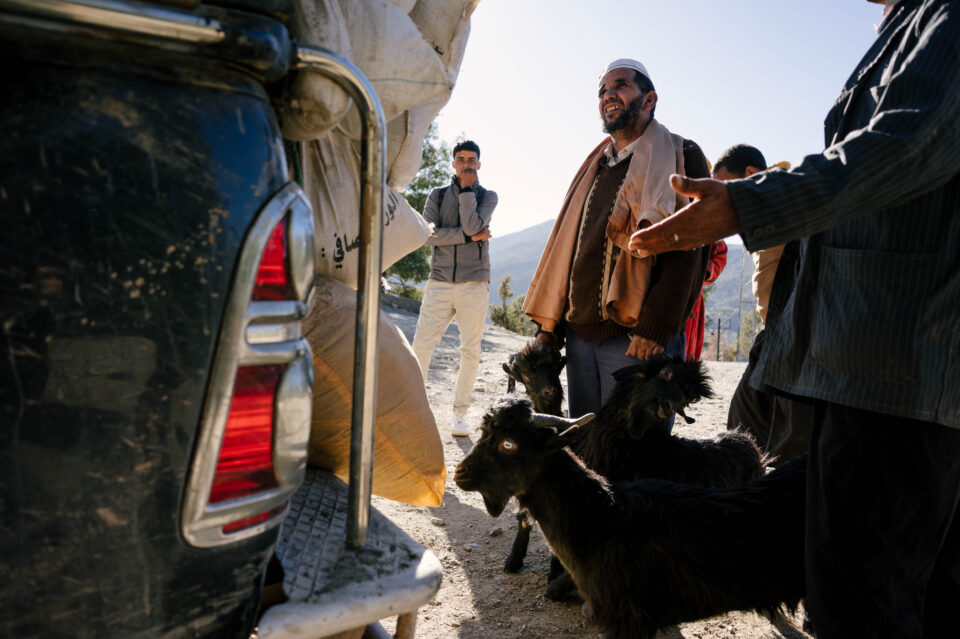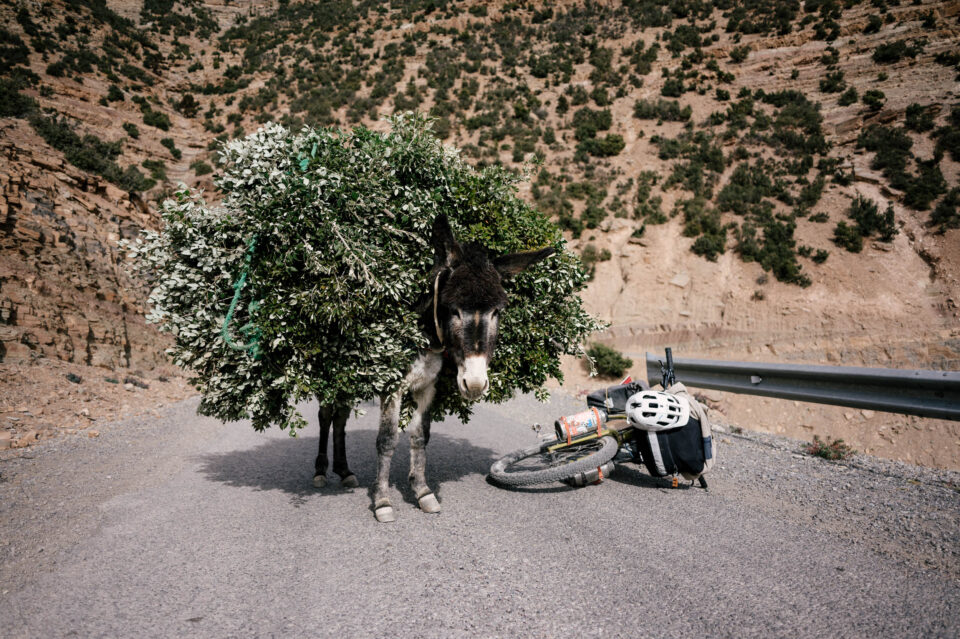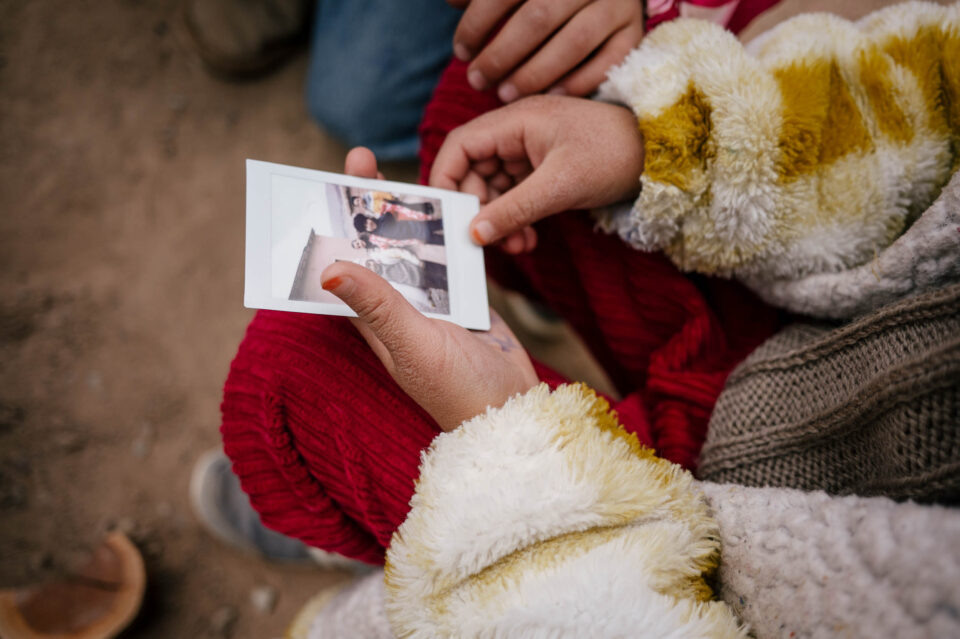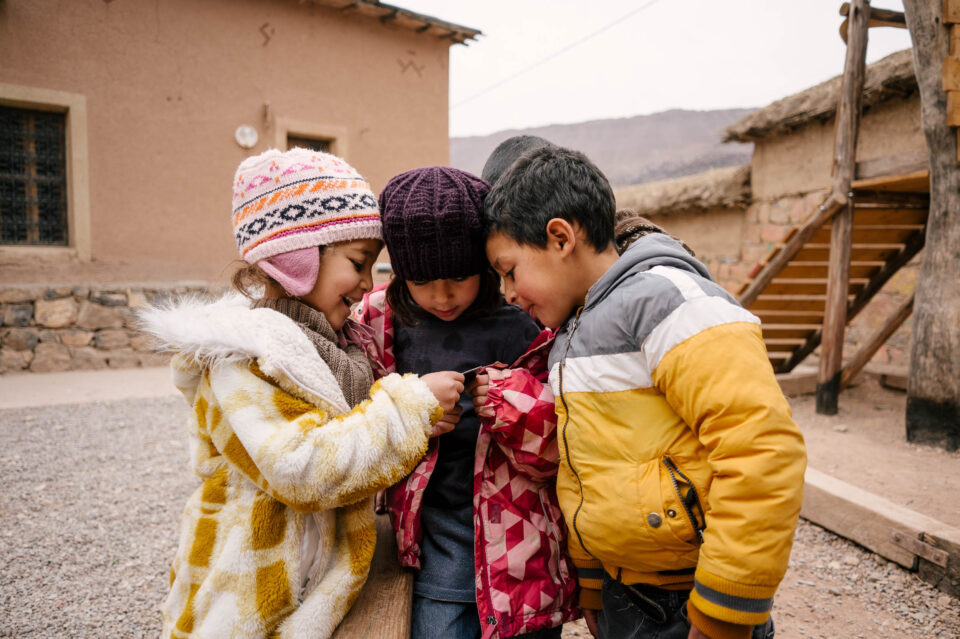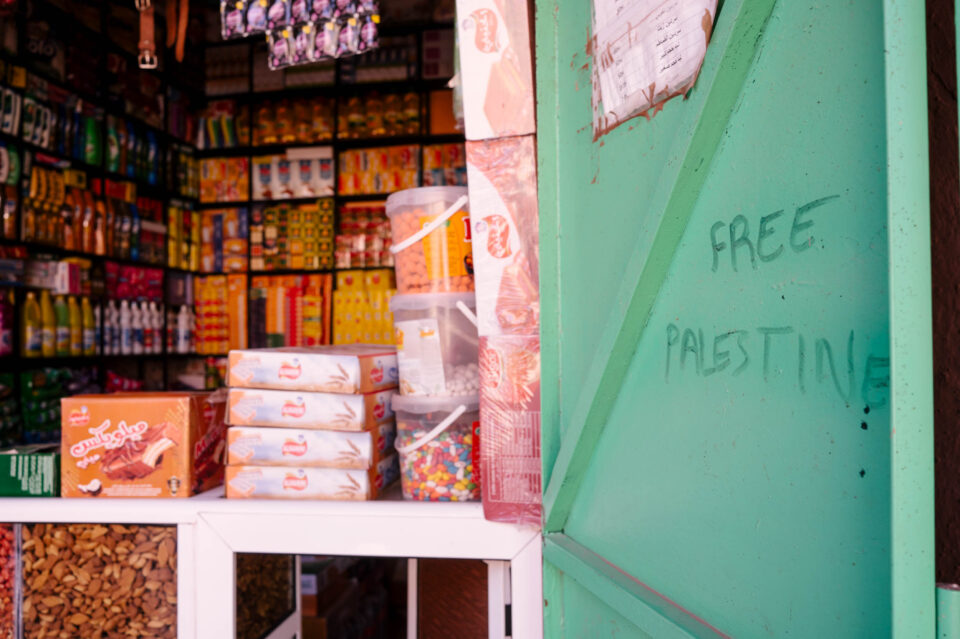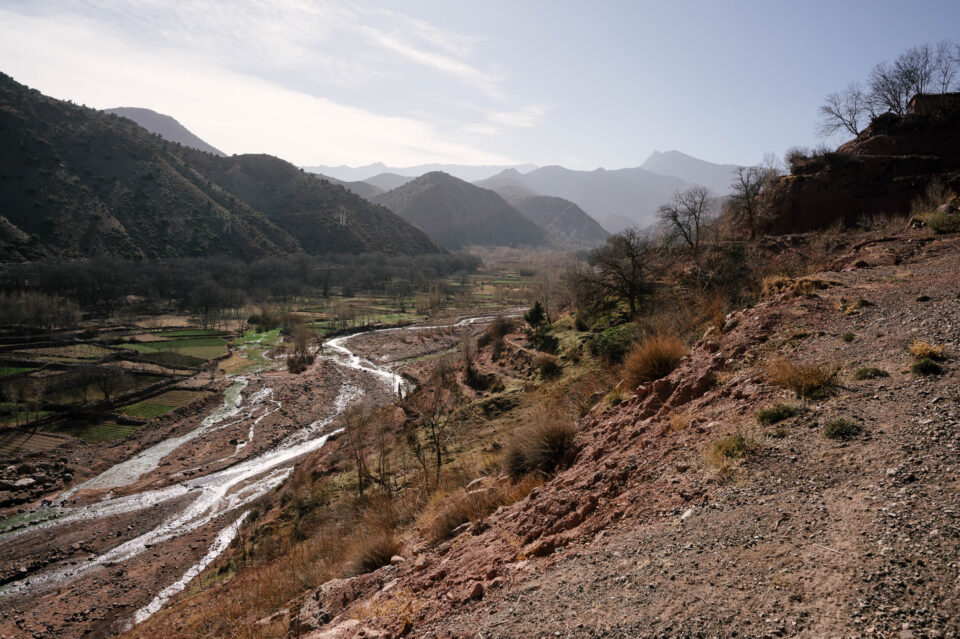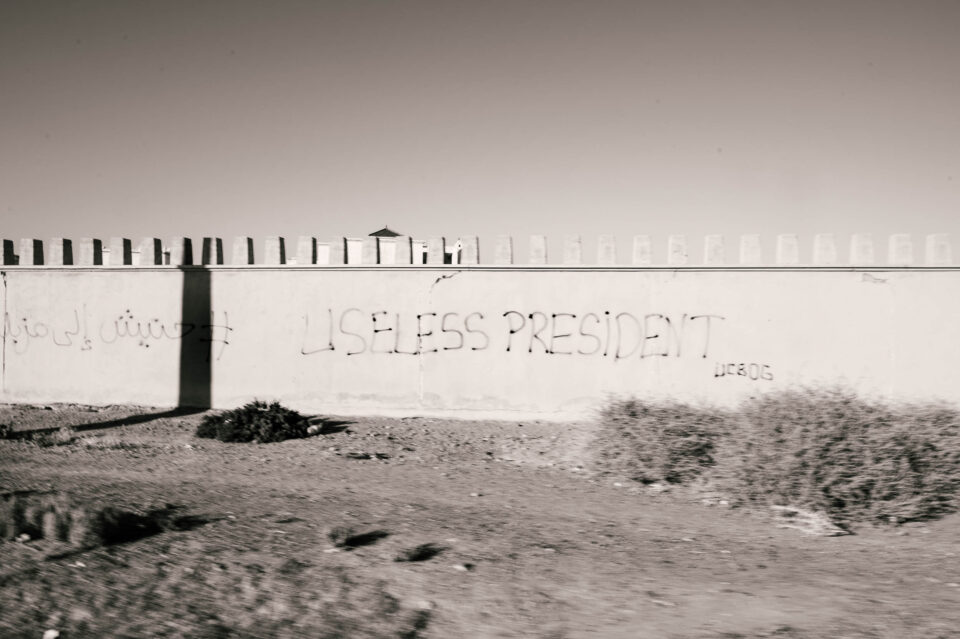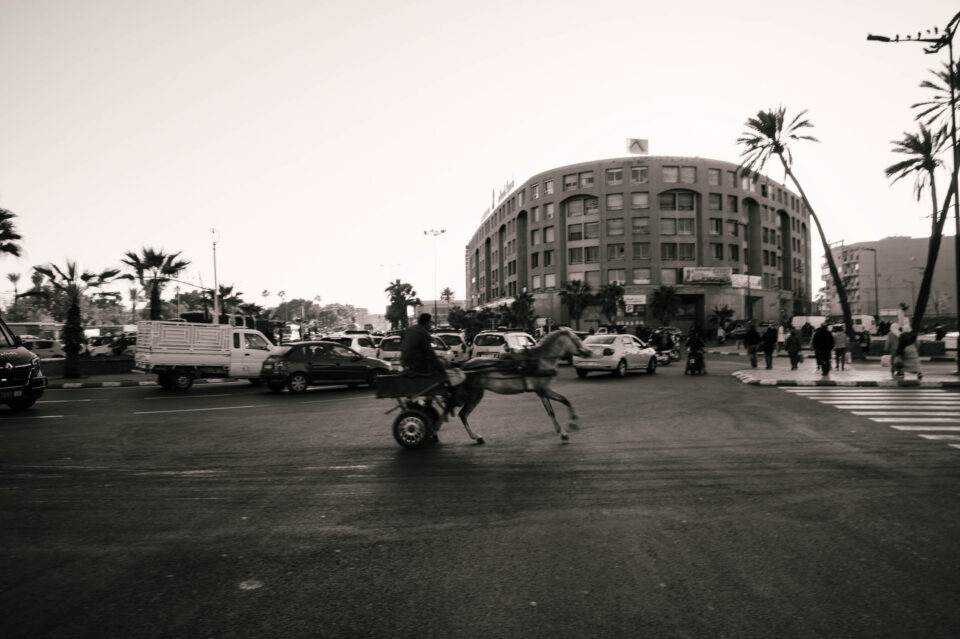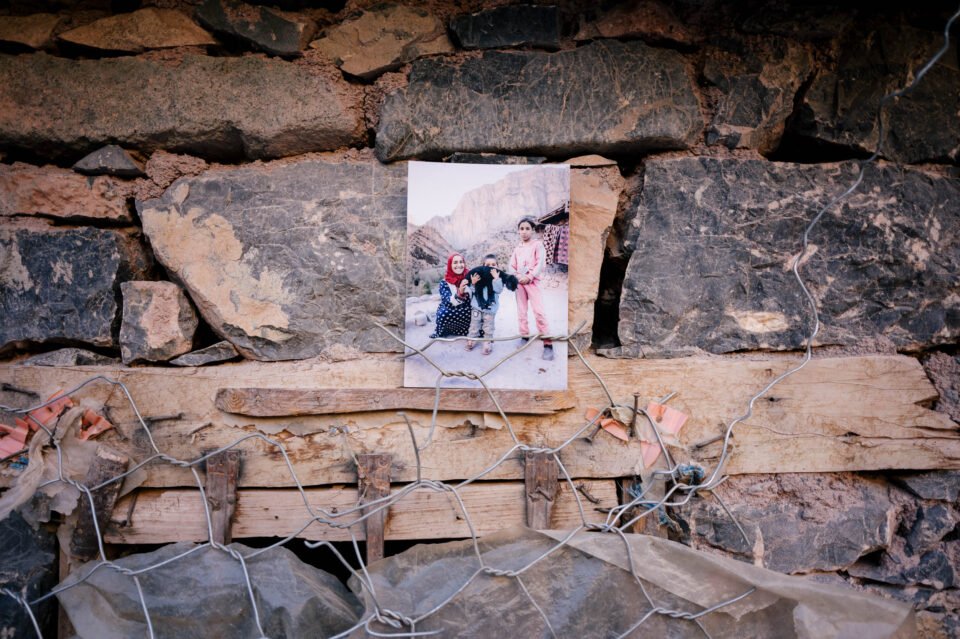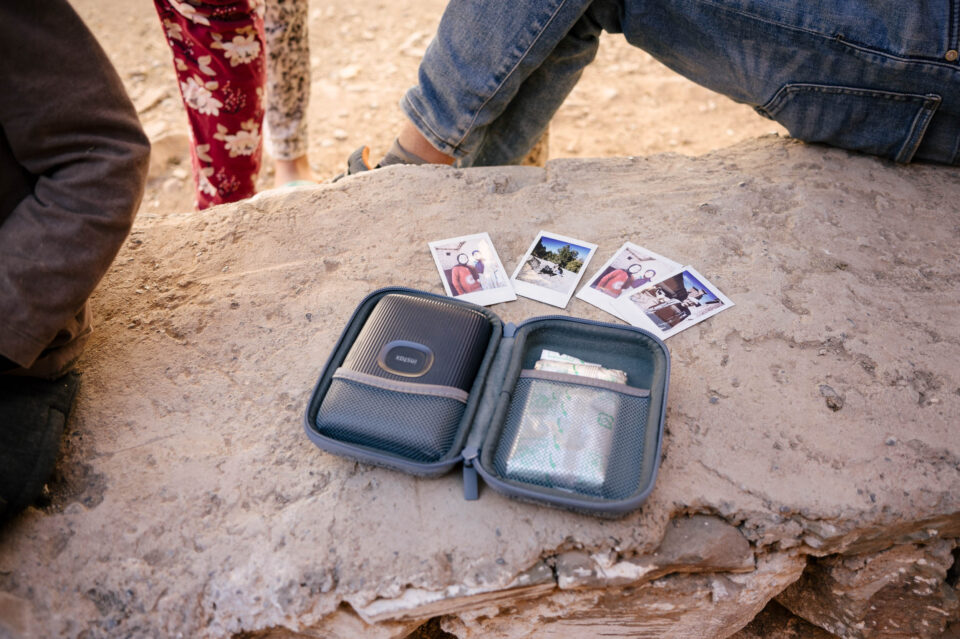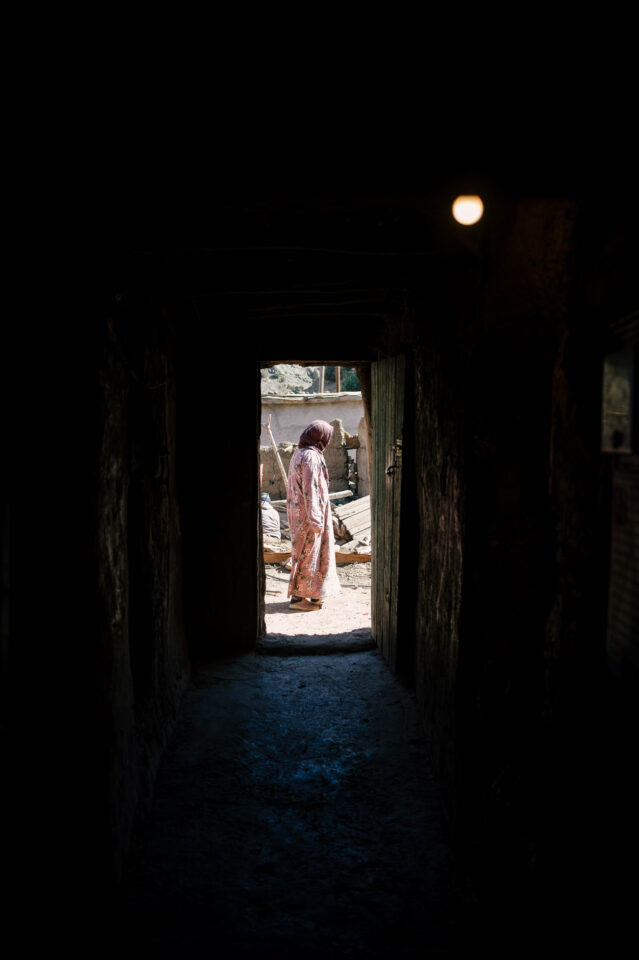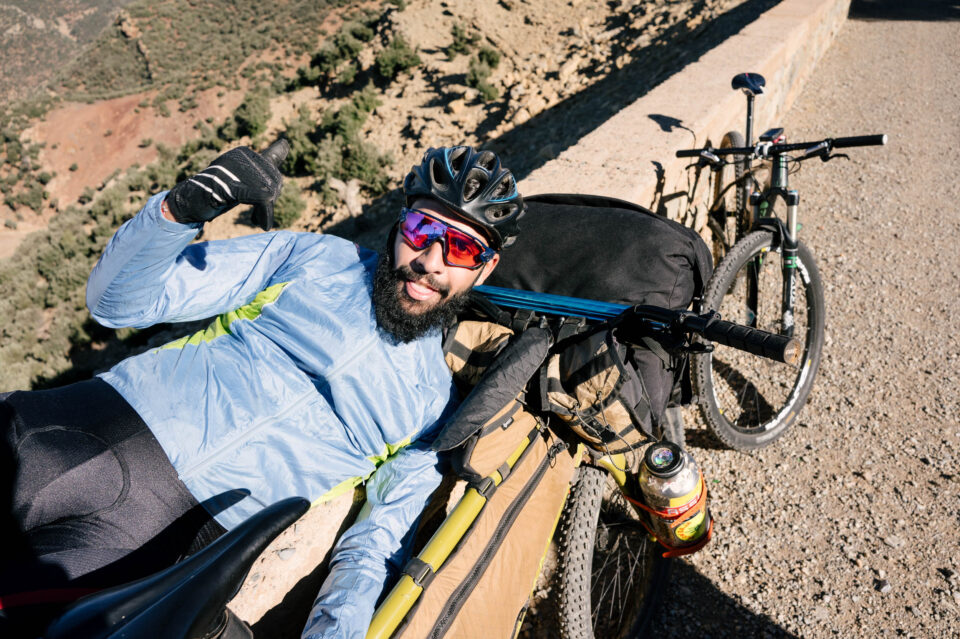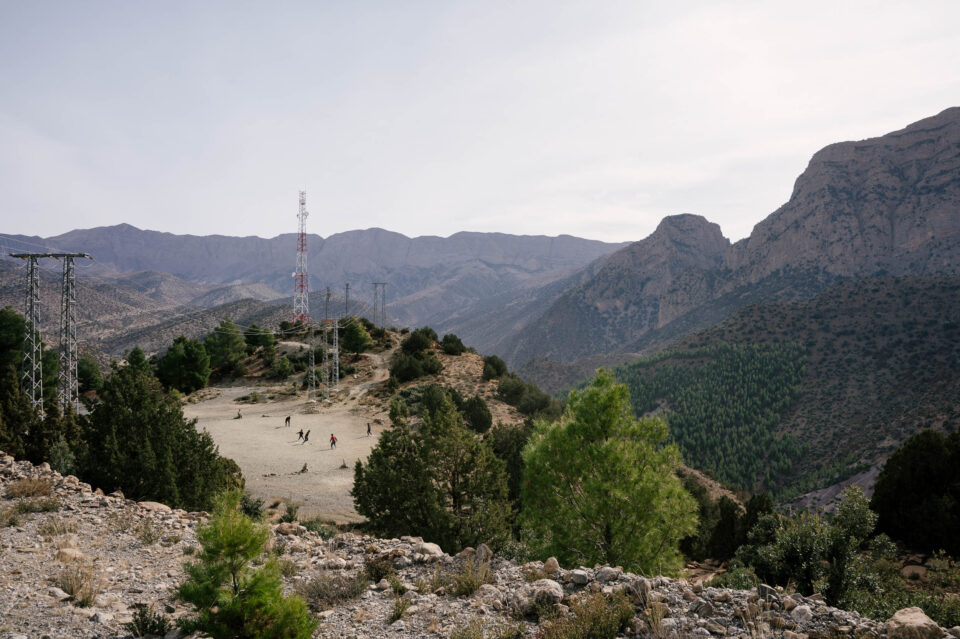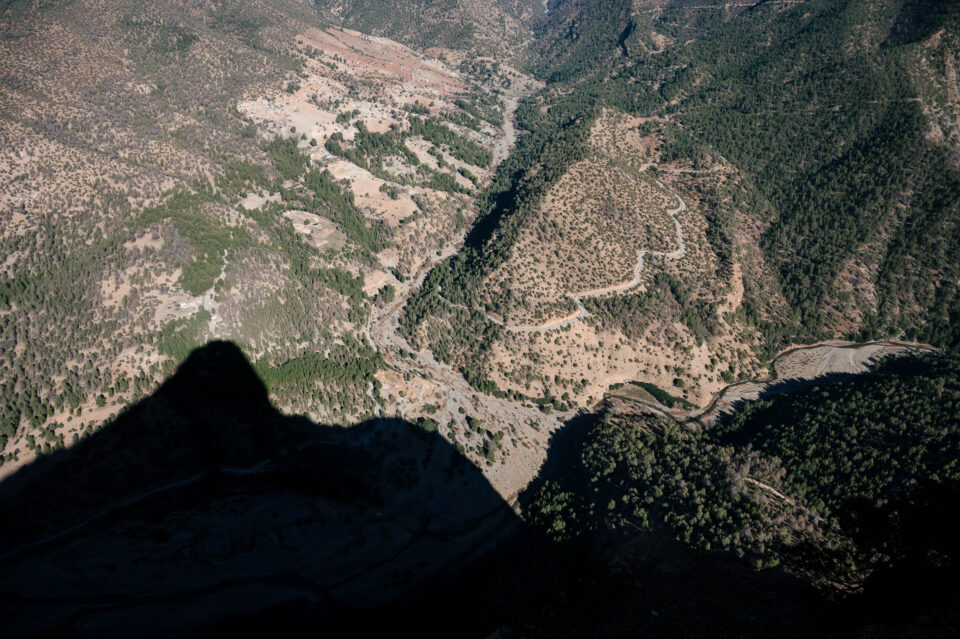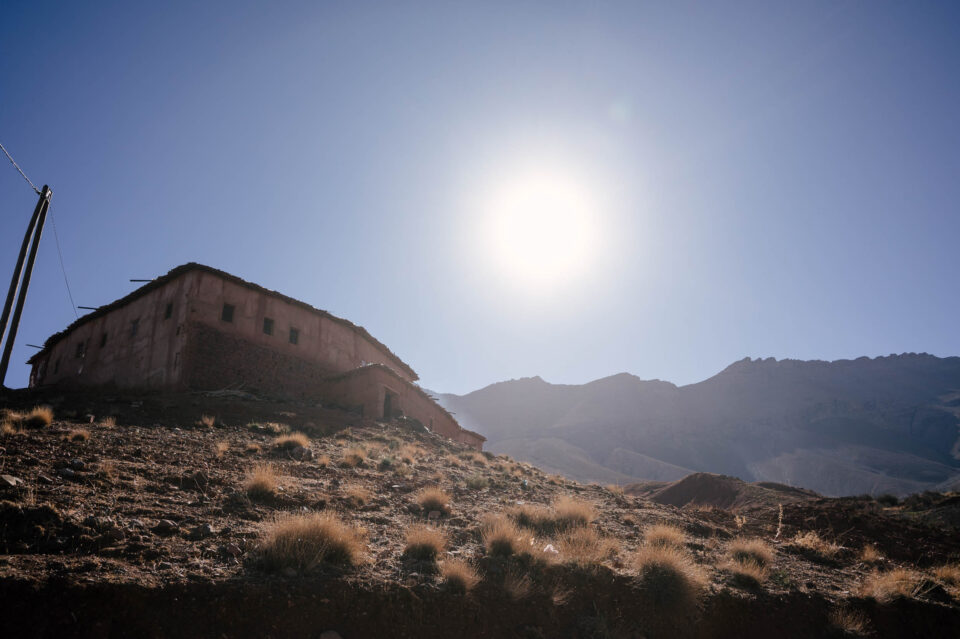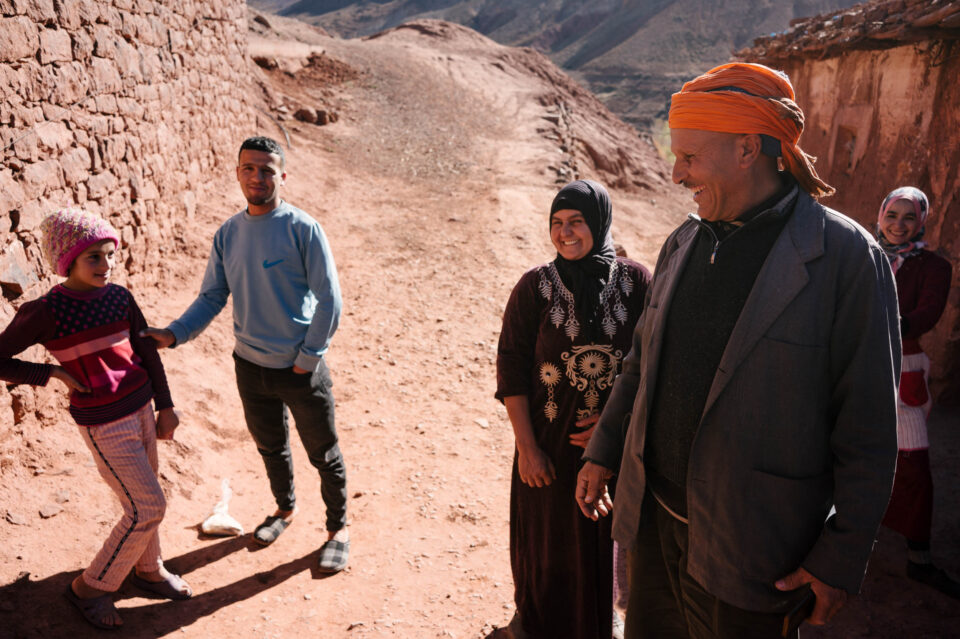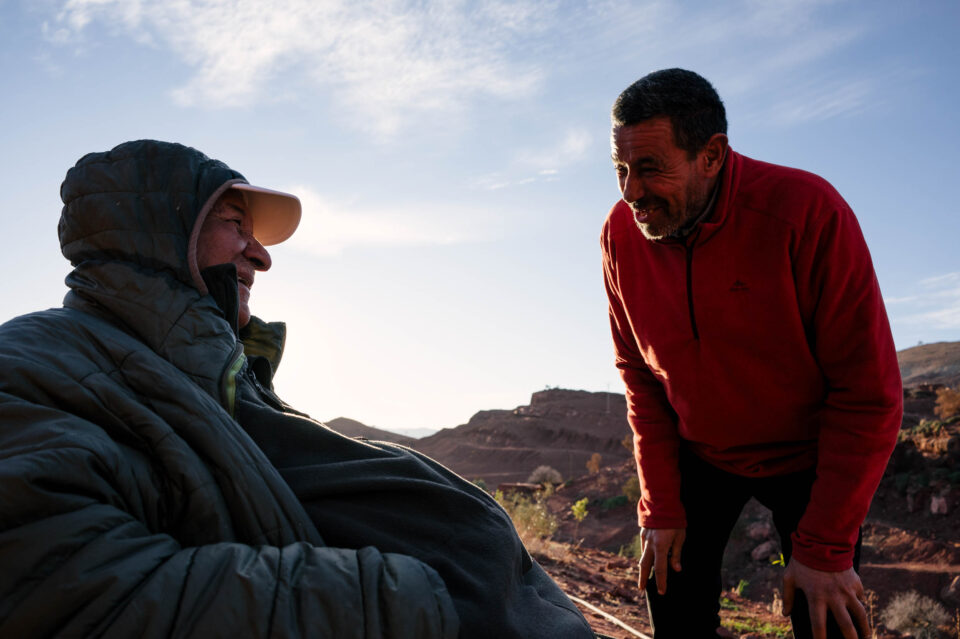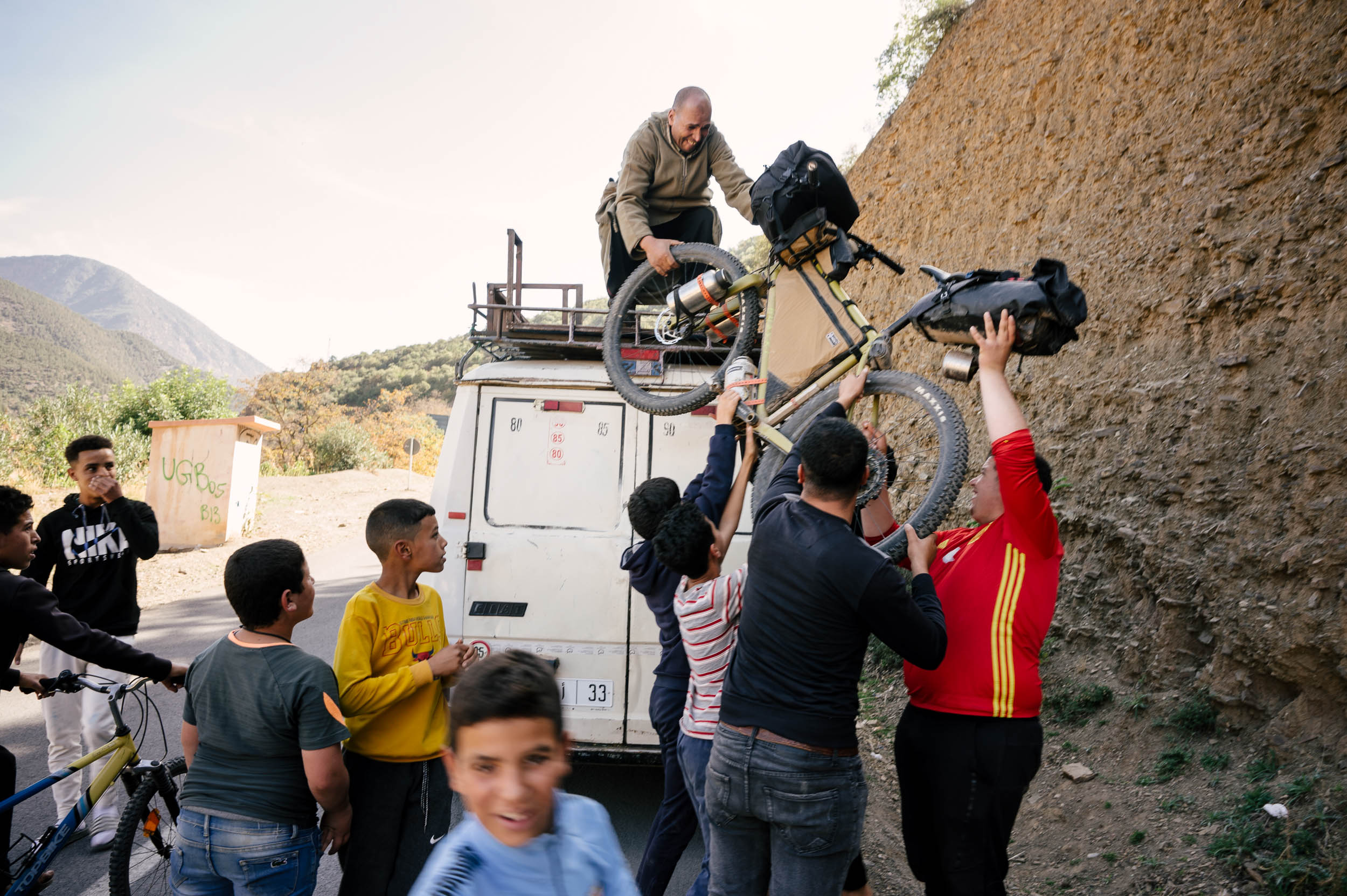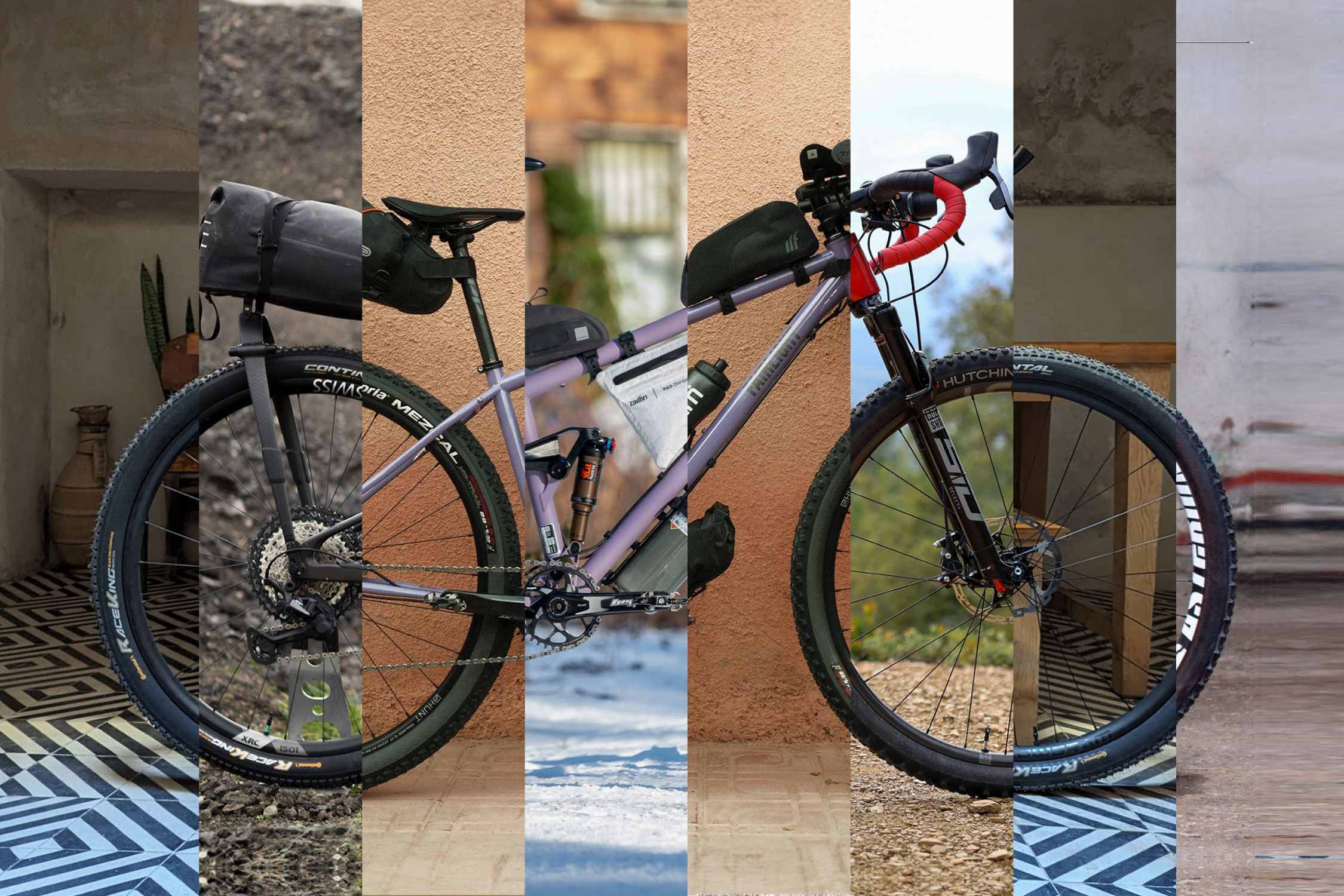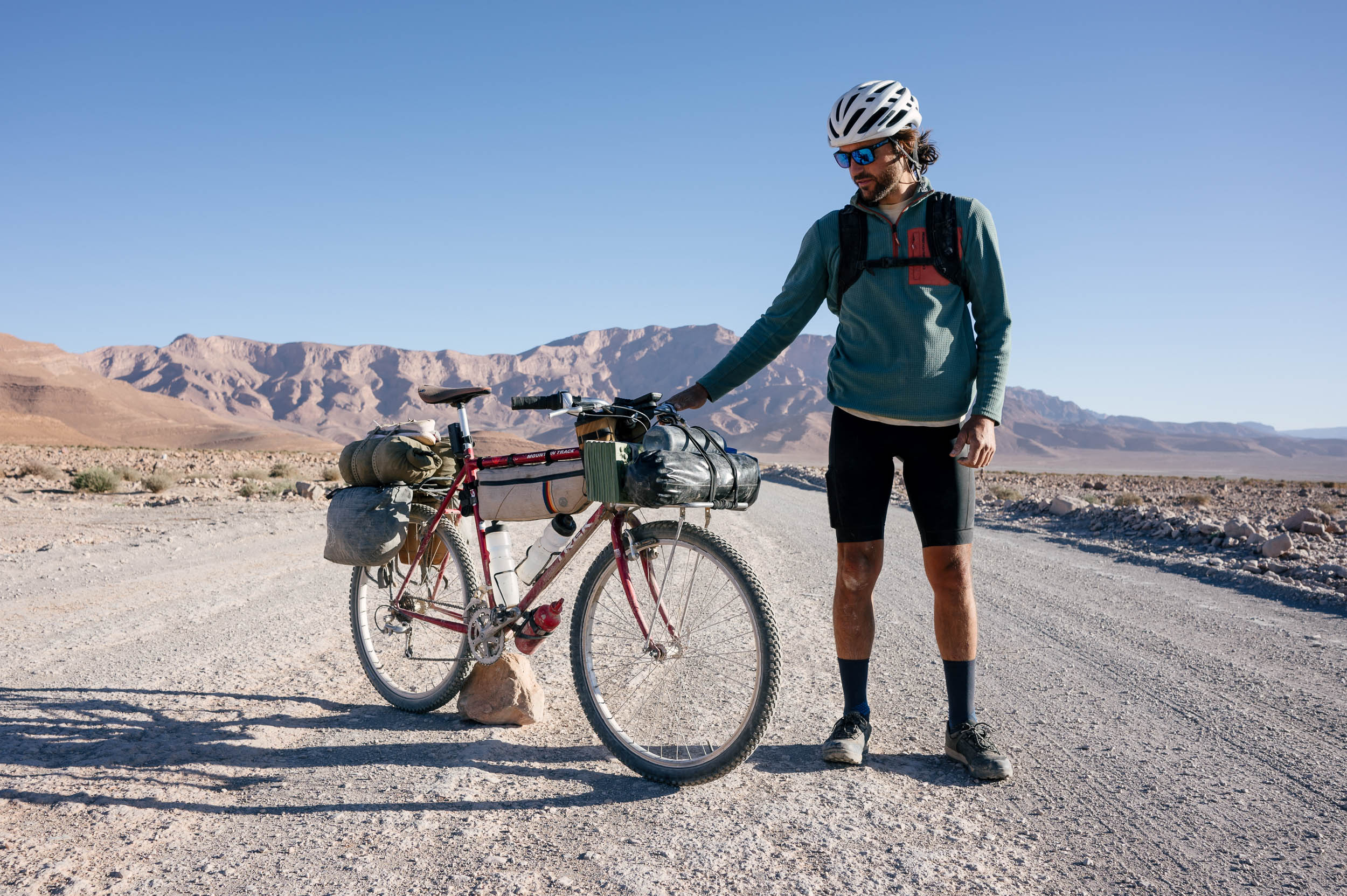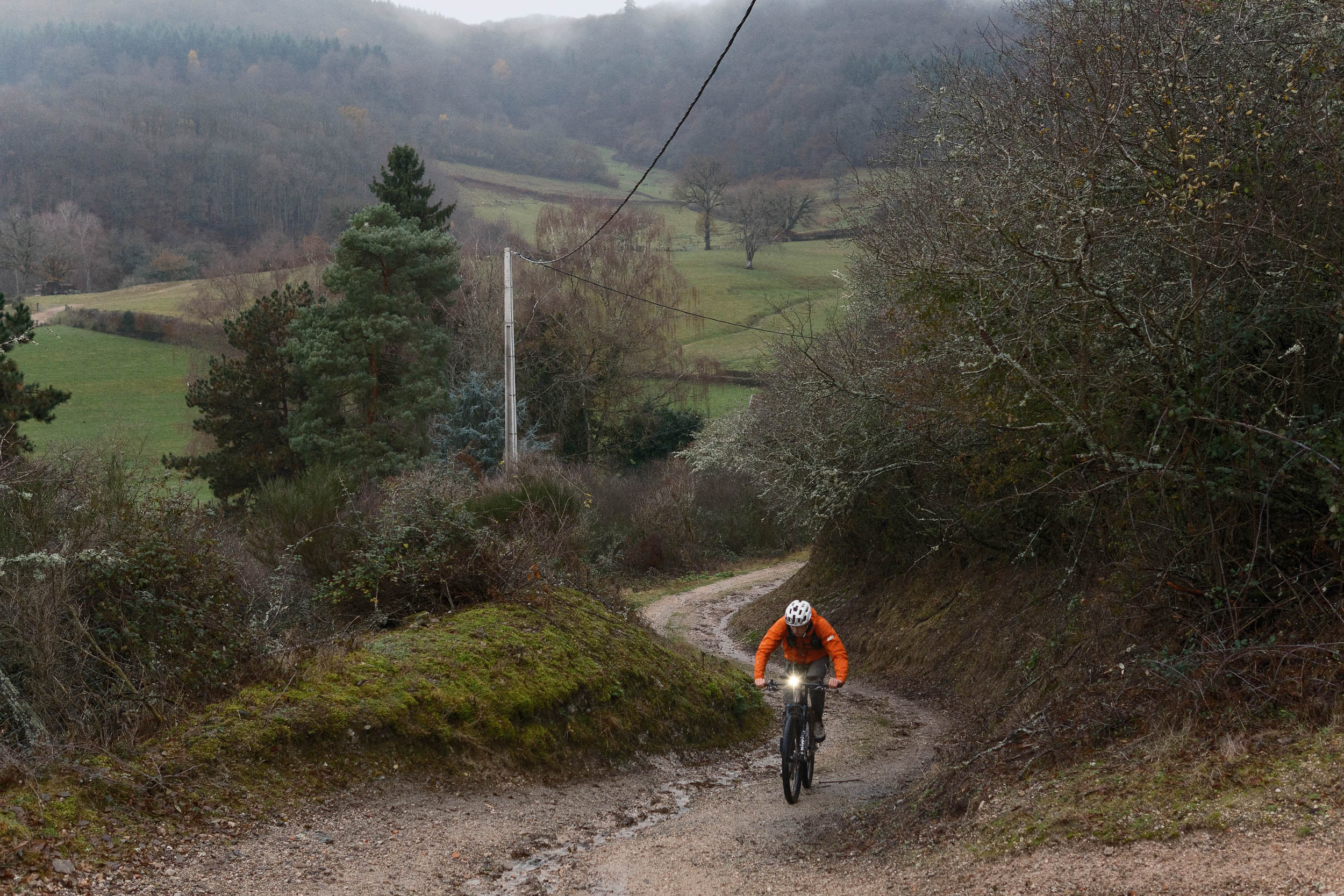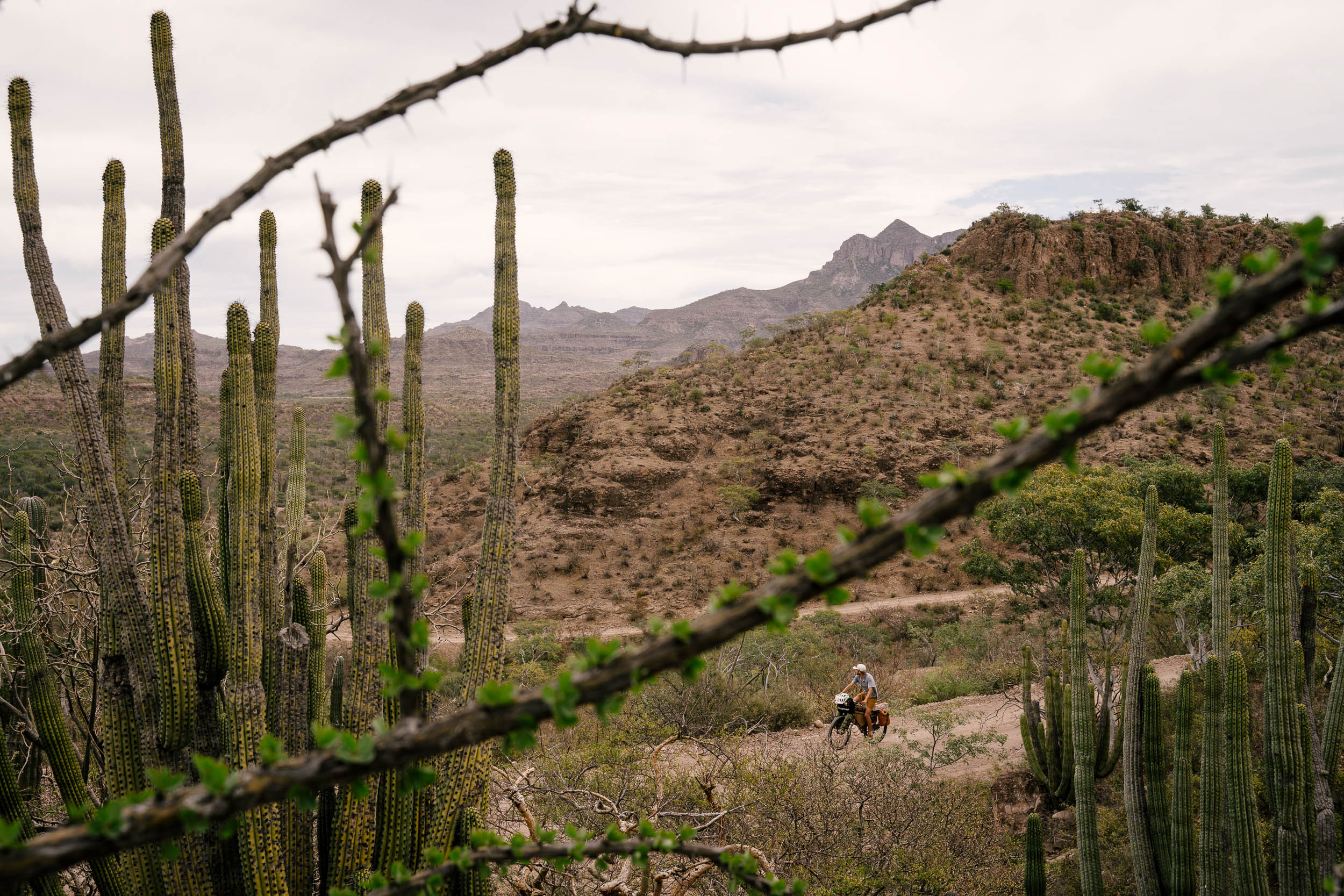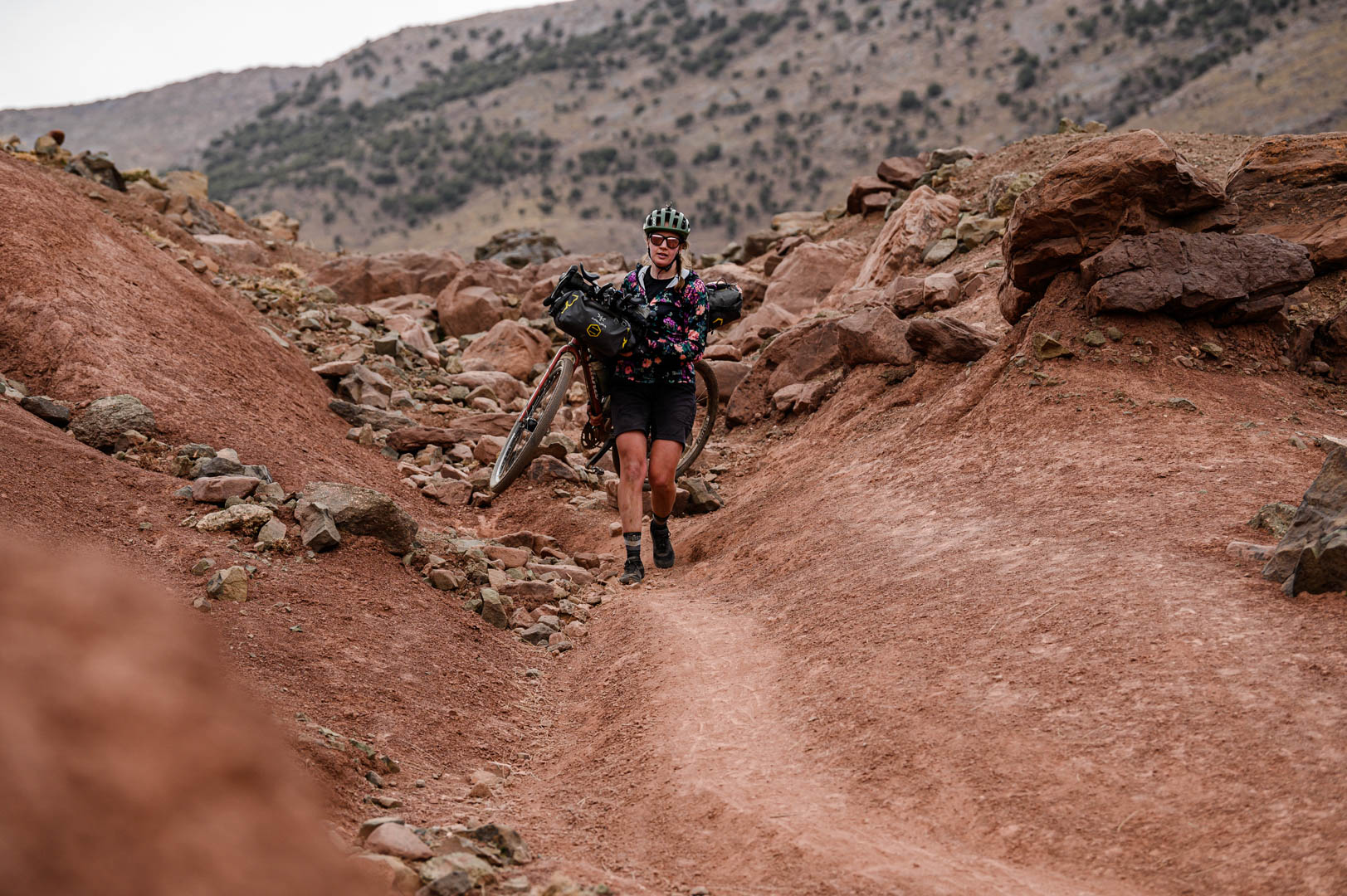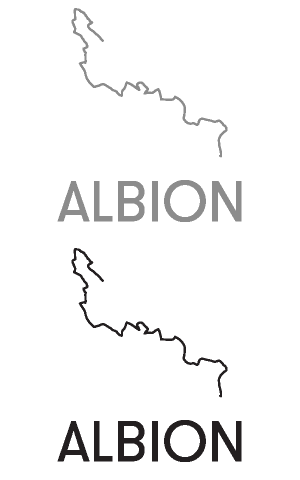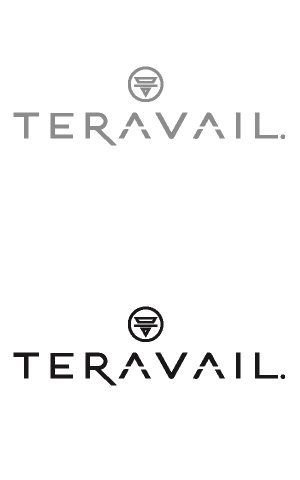Learned Helplessness: A Second Lap Around Morocco
In the conclusion of his two-part tale from Morocco, Evan Christenson re-rides the same loop around the Atlas Mountains to deliver the 46 portraits he shot during his first spin along the route. He’s met with a mix of familiar and unexpected experiences during his ride. Find the second part of his story and another exceptional photo gallery here…
PUBLISHED May 20, 2024
The police are back, sneaking around in unmarked cars, flashing cell phone cameras through tinted windows, and radioing in my progress. I think they never left. But coming off the backside of a long and remote pass, racing toward a roof and a warm bed for the night, the wind whipping, the sky darkening, the barking dogs and crying babies disappearing behind me, I see a car turn around and start following me again. They leave the lights off. They take videos and watch me walk into the guesthouse at the bottom of the descent. I stay there alone. They call several times to check that I’m there and ask for photos of my passport. I am not afraid of them, but I’m certainly nervous. Why is this continuing? What are they getting out of this?
The motorcycle cop, Abdullah, is waiting in the morning. There’s a police car down at the intersection. I take the back way out and duck into a building to sneak around them. The two pass by a minute later. I wait five or ten minutes, jotting down my thoughts in my journal to pass the time, anxious and upset:
“I am no longer myself. I am a character in a Tom Clancy novel, scheming and ducking and doing parkour flips and running from the police and now hiding in this smelly abandoned barn for no reason at all. Of course, they’ll find me again. This is sorta fun. But this is stupid. ‘What am I doing here?’ is racing in my head the whole time, and I’m desperately searching for some sort of answer or truth or purpose to this whole thing. I’m prodding around in these mountains, looking for the moment it all makes sense and for someone to give me the answer to life, but these police don’t understand that. I think they think I’m prodding around like a spy?”
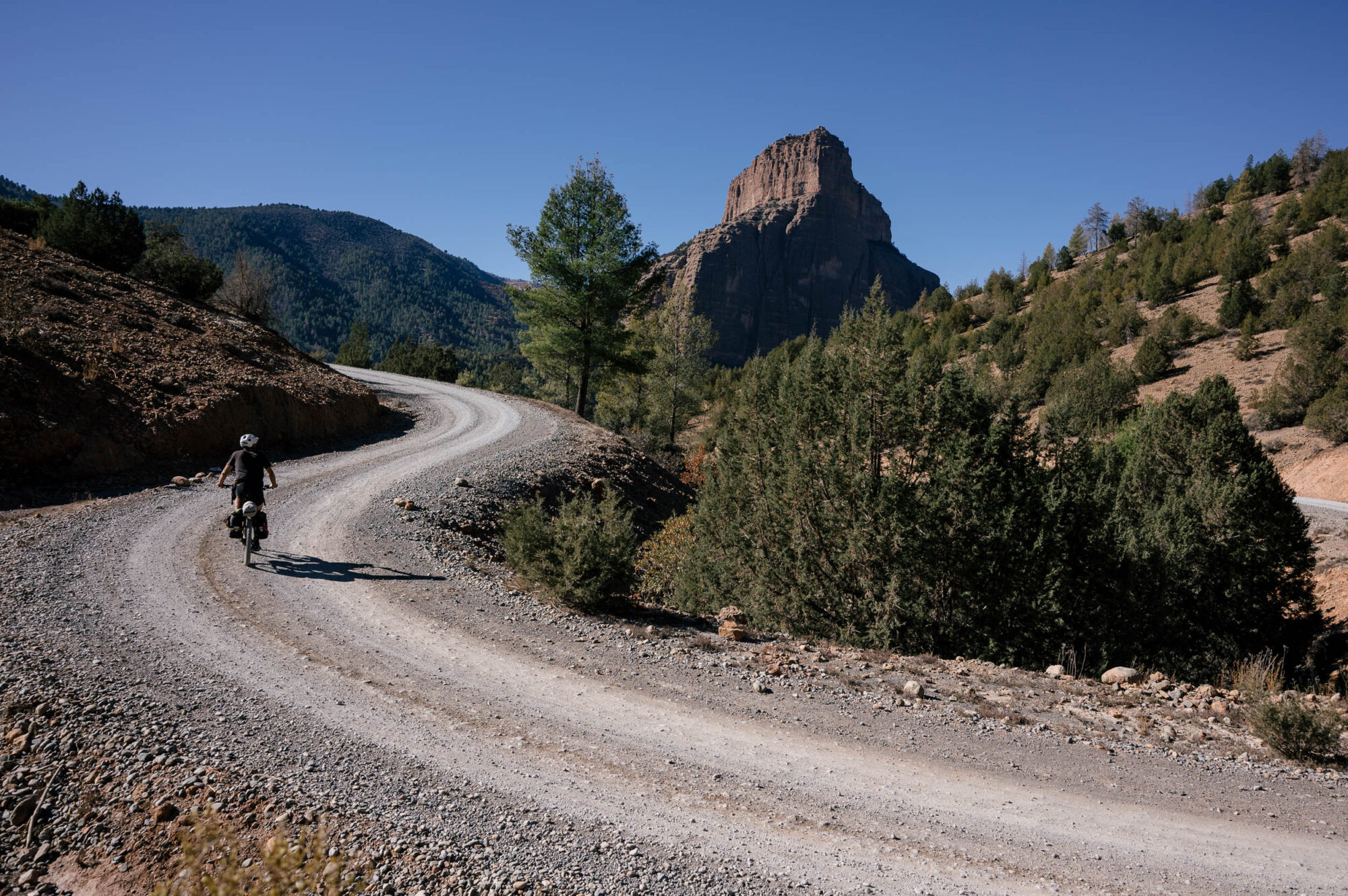
I wait to get back on my bike. I’m just down the road from a home I stayed at before, and I have two photos to go and give back. I’ve been on the bike for a week, and I’ve already given out 27 of the 46 photos stuffed into my framebag. I’ve been pleasantly surprised by the mixed reactions. I arrive around 11 a.m. and hide my bike in the goat pen. Lahcen has his sister bring tea, and the two of us sit outside on his staircase. His pink home—with the ornate white ceilings, the empty blue salon with the red rugs and fluffy pillows, both the wood stove and the gas burning in the kitchen—is quiet this time. The brothers are gone. His father is gone. His mother is gone. Lahcen and I sit, and I watch for the police to drive by on the street. They pass by two cups in. Soon after, they pass by again.
Lahcen just got the news that he didn’t pass the exam to go to university to become an Arabic teacher. The last time I was here, he showed me his study with his notes. He was excited to take it, confident he would pass. I was confident, too. Lahcen is a nice guy my age; he pauses before he talks, his eyebrows twitch, and he always looks like he’s thinking. He speaks four languages. I met him on the side of the road. He was sitting alone reading. I asked if he knew a place to camp nearby. He said without hesitation, “Just stay at my home.”

Lahcen said if he didn’t make the selection, he would apply to be a truck driver. This valley has seen a roaring uptick in apple harvesting and subsequent transport work, and he was hoping to work there. But they also turned him down. Everyone is looking for a job, and the traineeship is backed up five years. So, it’s a Wednesday at 11 a.m., and Lahcen is home, walking down the street and kicking rocks, waiting for the apple trees to bloom again so he can harvest in the fall. He says he’s waiting to get a good job before he can get married. He’s not confident it will happen soon.
The phone rings. Lahcen turns away, says a few things, recites a number, looks at me, laughs, and hangs up. “Police?” I ask. “Of course,” he says. I groan. I can’t help it. I crush walnuts in my hands and vent my frustration to him for having the police back:
“Maybe this is the whole point. To travel is to experience life in a different world, both its beautiful possibilities and its frustrating limits. Maybe this embodies your life here. I talked with several people who wanted to get married to a certain person and were rejected from it, by either their families or the government. And all these people frustrated by the economy, you included, who want to leave for better job opportunities and are looking to Europe and the United States. I will never know your anger, but I wonder if this frustration I feel is related. This is the closest I’ve ever been to a police state, to restriction, and I hate it. This mere feather of a chain brings me to my knees. I want to feel liberty and freedom. That is why I ride this heavy bicycle. But we all want that. Every human wants a meal and clean water and the ability to do what they choose. We declare it an unalienable human right. For you, it’s the ability to get the job you want. For Toma and Moh, to marry who they love. It should be the ability to go where you choose, how you choose, without surveillance. This restriction is wrong. This corruption is wrong. These police units are just… wrong.”
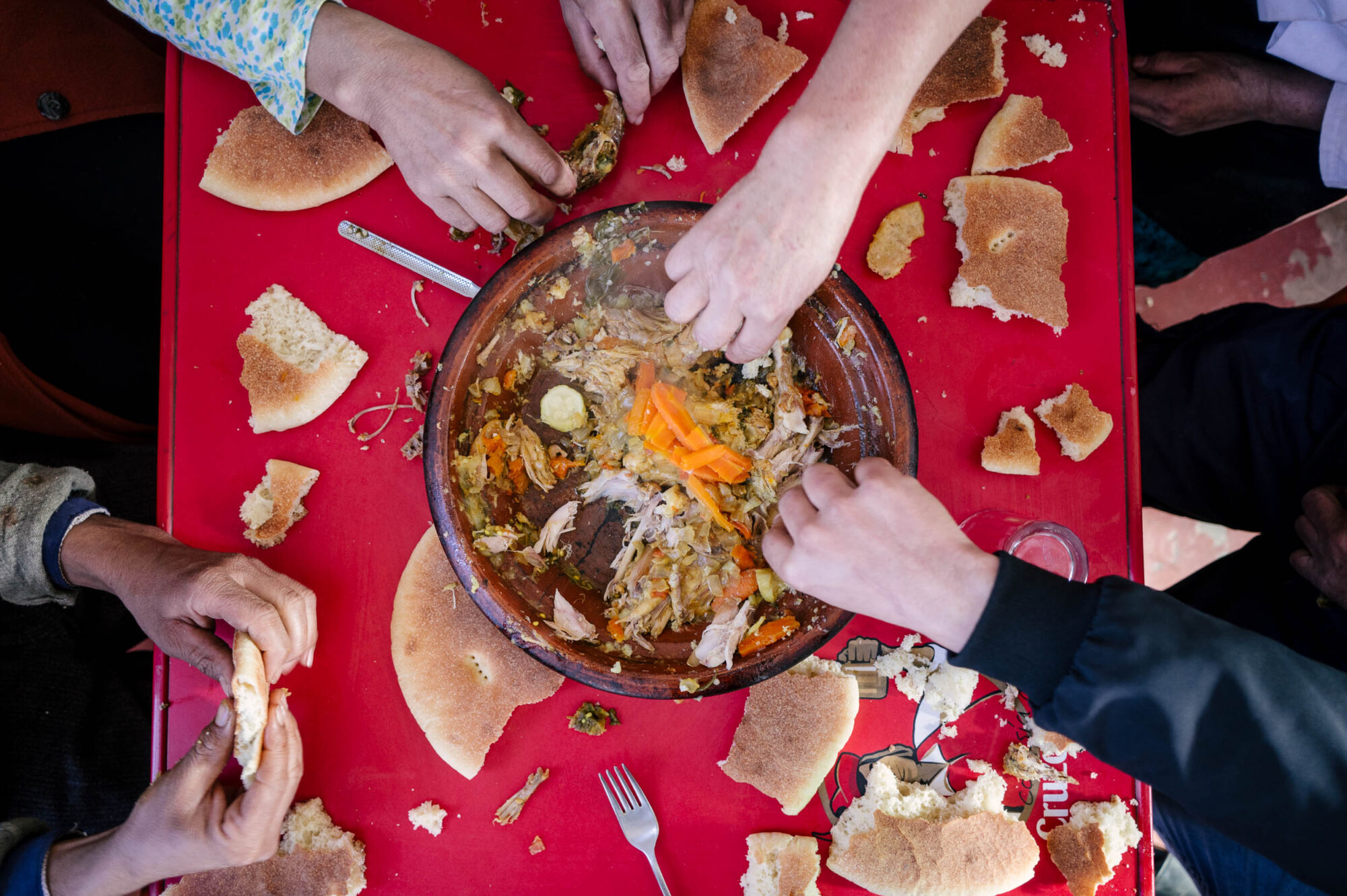
Lahcen nods in agreement. He’s quiet. I wonder if I’ve crossed a line, and he doesn’t say I have, but he remains quiet. We finish our tea and hug each other goodbye, and I pedal off, knowing the police are coming back, accepting the inevitable. The bike rolls easily on the downhill. Houses pass by. I wave to the kids running in the street. I feel burdened.
There’s a tent on the side of the road with people walking in and out, cars parked, and donkeys tied up outside. I pedal up, and they invite me in for tea. I hide my bike around the corner and walk in. It’s a big tent, festival-like, with bright colors and ornate decorations, the silhouette of the mosque windows on the muslin walls, gold trim, and flickering LED lights. A few tables, mostly empty, some people sitting for tea, men walking in and out of the adjoining house in back. They bring the cauldron so I can wash my hands. Then tagine. And then couscous. I don’t understand what is going on. No one speaks French. The police walk in.
Abdullah, the motorcycle cop in charge of following me, sits down, washes his hands, asks me how I am, and smiles. He looks comfortable here. We talk about football. The Africa Cup is set to begin next week, and Morocco is the favorite. We share a tagine and he explains the whole process. It’s a funeral. They have an open home for two weeks, and the whole town will come by at some point to eat. There was no explicit ceremony, no singing, no dancing, but here, eating is essentially that. There are three ceremonies in everyone’s life. Birth, marriage, and death. Nothing else is really “celebrated.” New Year’s and birthdays are normal days. Independence Day, too. The man who served me is the son of the woman who died. He is also, coincidentally, the de facto village chief. Normally, his job is to know everything, like a sort of human phone book. He came to check on me when I first stayed with Lahcen. Now, it’s his job to cook for the whole town, in his mother’s memory. They don’t know why she died. It was just her time.
Sitting in the tent, chatting with the neighbors, another round of tea, a couple more hands in the tagine, Abdullah and I start to… hang out. He takes me for coffee afterward in his favorite cafe. He translates at the next house I return a photo to and sits with the next family that invites me in. I always introduce him as my police officer. I ask why he’s still doing this. The captain said he didn’t have to follow me anymore. Let’s give him a call! He dismisses the point as if the captain in the city doesn’t matter. He’s the captain here. He calls his own shots and sits there on his tricked-out Chinese 125cc motorcycle, with its blinking lights and Valentino Rossi stickers, and idles slowly behind me. I can duck into the drainages around the bend and pop out an hour later, but he will always be there waiting. He stays near when I’m sleeping. He follows me into the canyons. He must know what I’m thinking by now.
I think back to freshman psychology class. There was that story about the dogs who were locked in cages, and the floor would electrocute them. At first, they would leap up and howl and fight it. But after five minutes, they would see there was nothing to be done. This is the world they are confined to; there is no way out. The dogs would begin to lie down and accept the electrocution. The monsters holding the keys called it Learned Helplessness. I invite Abdullah to watch football with me the next day.
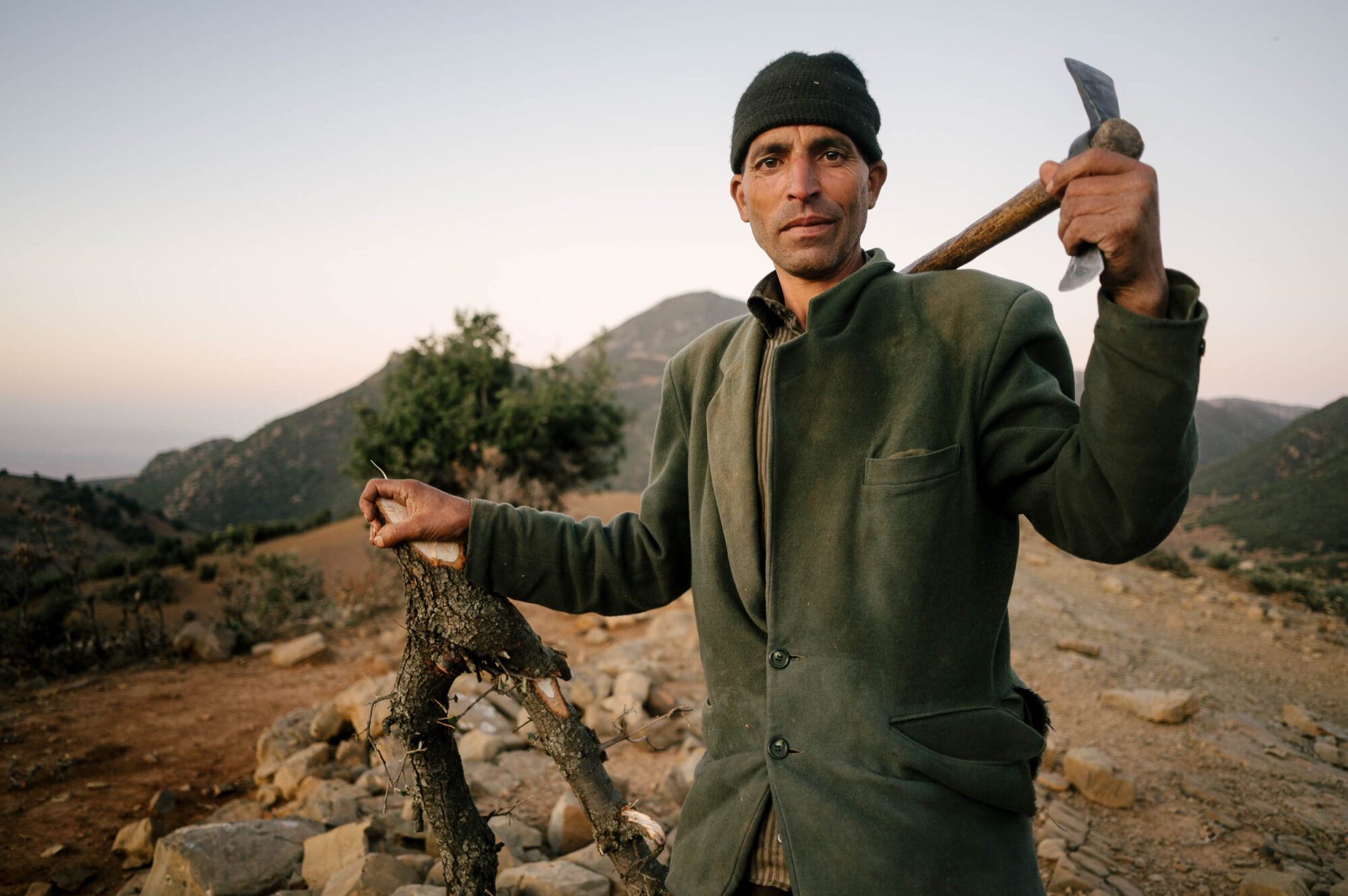
I pin this whole thing down to a cultural misunderstanding. There is something a few layers below the surface that makes this exchange so unproductive. Quite often in Morocco, I notice that people have a different tolerance for danger. I ride mountain bikes with some guys my age in the mountains. They do wheelies and skids and ride with no helmet, but on the descents, I go ripping off, riding fast but still feeling totally in control, and they yell at me to slow down. “It’s dangerous!” they call out after I let them catch up. One night, a man lets me camp next to his house. After I set up my tent, he offers me his own bed. I’m honored but try to turn down the proposition. “But it’s dangerous outside!” he says. I maintain that, in fact, it is not dangerous out there, so he builds a fire and sleeps next to me all night to keep me safe.
The police say over and over how following me is just for my safety. I ask what’s dangerous about riding here, and they say there’s nothing to be worried about. There are no dangerous animals. The people have all been friendly. So then I say… why follow me? And then they say, yet again… for your safety.
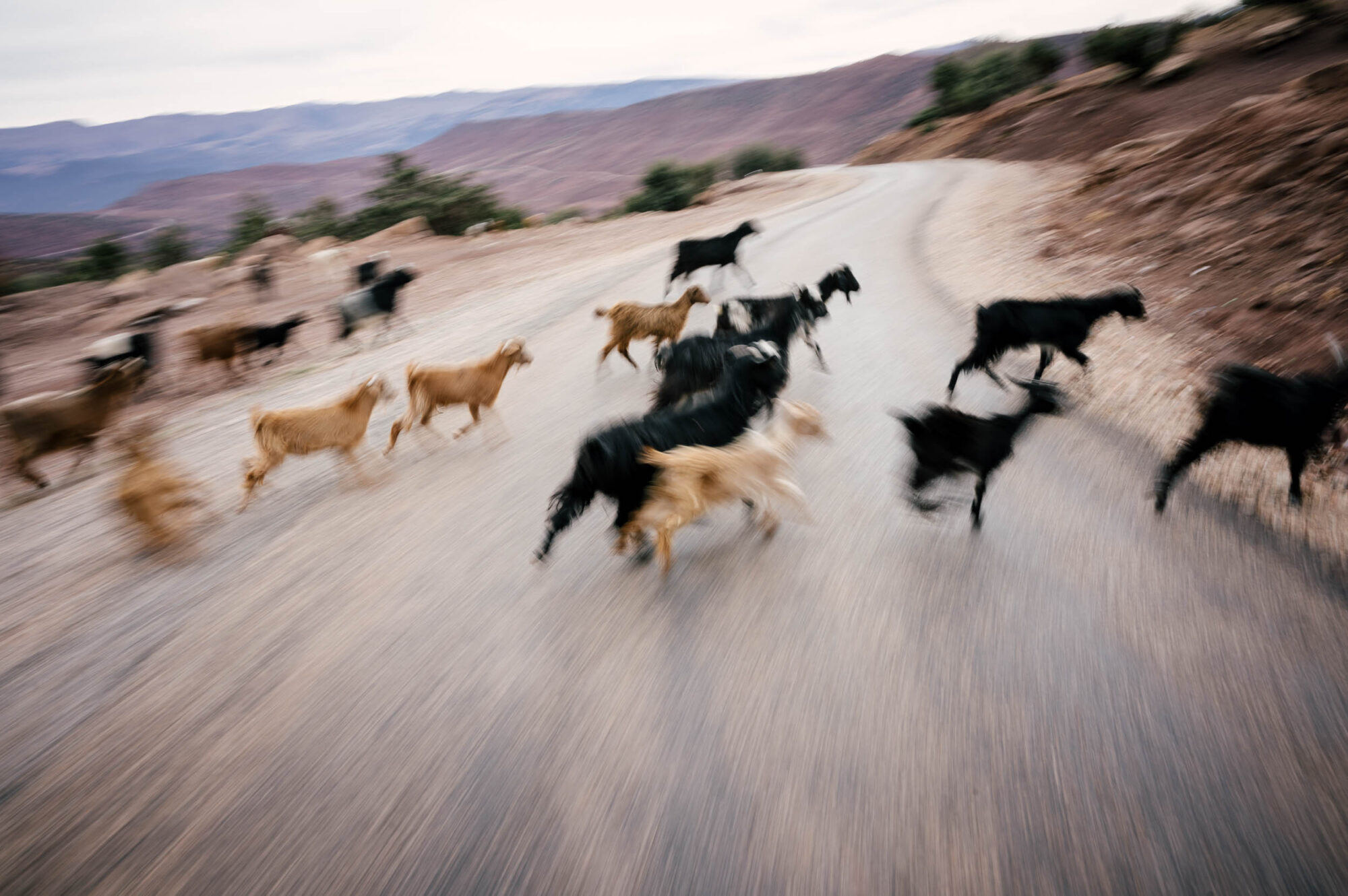
Riding with a police escort is almost like vlogging. Being on camera, I’m hyper-aware of my actions. I do things, and I think, “Oooh, I’m doing this thing now. This will be remembered! Strangers will see it!” and it makes for a certain uneasiness and an added layer between me and the world. Being watched all day is similar. To get better on camera, you have to shut that part of your brain off, and I find I need to do the same thing to be comfortable with just existing here, followed in this police state. No matter what I do, they watch. I wonder what they say to their captains. I wonder what they think to themselves. But with my new “friends” and helpless to avoid a system I must live with, I ride on. I am on a mission to return these photos. I have made a promise. The bike gets a little lighter with every photo I give out. I still struggle to pull it up off the ground. I tell Abdullah where I’m headed and pedal on for another pass.
Returning to a place a month later is a reminder of your own futility. The world continues to move and change and act without you. People are different. Things look the same but also different. I notice new mountains, trees, and buildings, and I take a slightly different route when I can. But it also shows me how circumstantial it is to make friends while traveling around. We are confined to our snowglobes of perspective, and they occasionally intersect with the globe of another, creating the potential to become friends.

But sometimes when I return to give a photo back to them, they’re gone. Or they’re busy. Or they’re in a bad mood. The babies are crying, and the dogs are barking. I ride looking for the same experiences I had the first time and often miss them. Mohammed isn’t home. The boys I played the best game of football with are all gone. The conversations with the others are all similar, though. The introductions, the smiles, the clanging and smashing of Arabic and English. Everyone asks if there’s snow where I come from. A month later and still no real snowfall. People are getting nervous.
I push up and over another pass and descend into a home I’d stayed at for the night last time. I arrive on the night a neighbor is over giving them a gift. The woman just had her first son; she will now be called the mother of him, and the neighbors are giving them 50 dirhams ($5 USD). Incidentally, I photographed the two of them together my first time around, and I walk over to give them their portrait. They smile and look at each other, and with the baby in one arm and the photo in the other, she bends over and hugs me.

This family had never had their portraits taken. They had no photos of themselves in their small home in the mountains. Nothing to show their children, neighbors, or selves in the future to remember. Later, a man I give a photo to says he hasn’t had anything of himself printed since he was married 30 years prior. Now that everything lives on cell phone screens, why print them? But cell phones die, they get lost, they break. This piece of paper should last decades. I try to explain how this photograph on this piece of paper is the nail in the sands of time—the same sands that destroy every new phone after five years. My words must sound like potato salad. He nods in a muddled agreement.
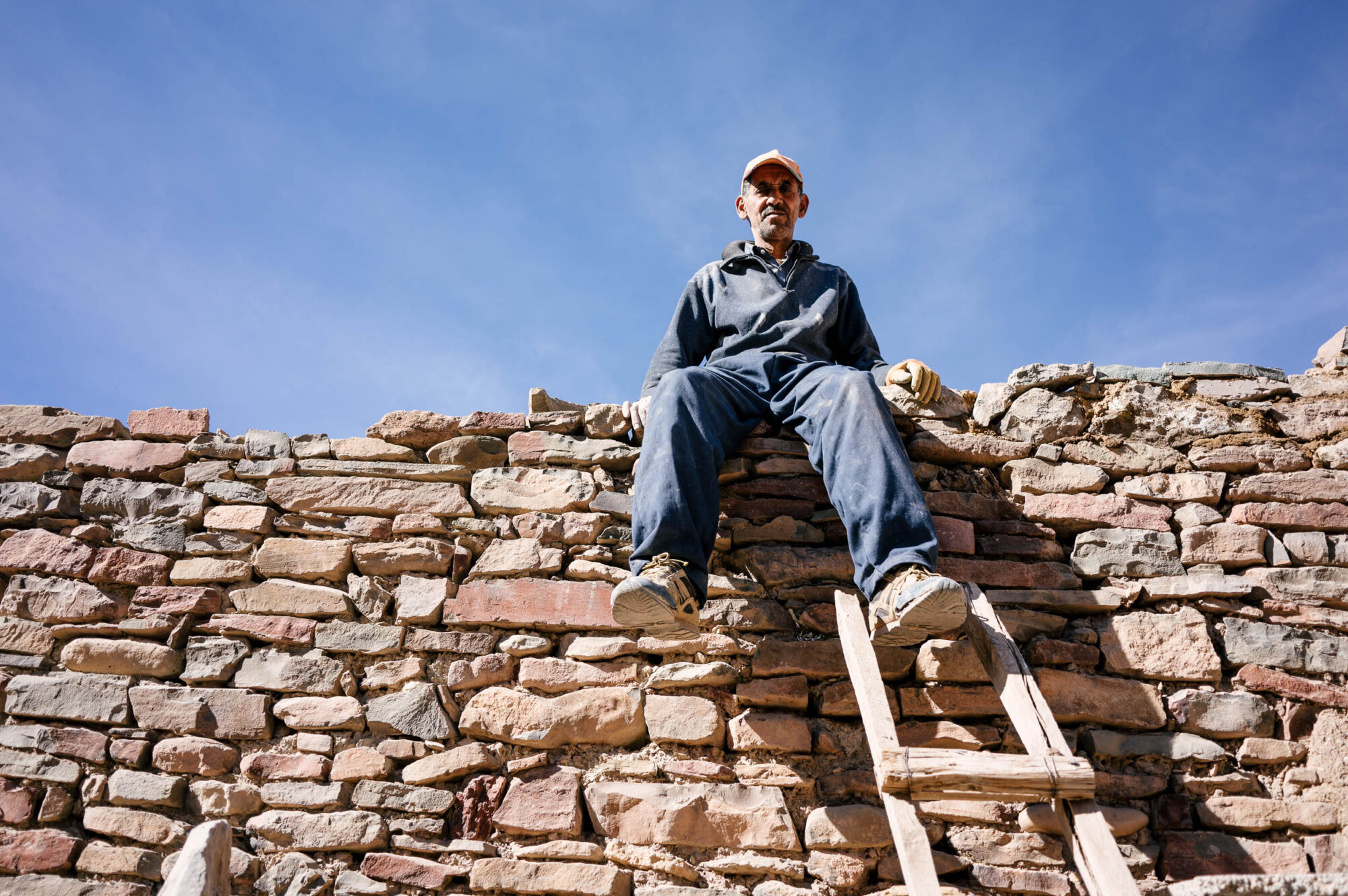
As a supplement, I pick up a small Polaroid printer to fill in the gaps of the new friends I make on my second lap. Some cultures believe when you take a photo, you’re taking a part of someone’s soul, the Amazigh included. And whether or not you believe that, you are definitely taking something. But I also believe that when you give that photo back—to the same extent you’re also giving this person back a part of their soul—a piece of their soul that can now be held, examined, shared, and remembered. With physical photos, we can bend them, pass them around, pin them to walls, and slide them into wallets.
With the big photos, when people see me a month later with a photograph I took of them, reactions are all over the place. Several people ask me if I want money for the photo as if this is some sort of terrible business plan I’ve come up with. Two people rush around to find a gift to give me in exchange. Some people are confused. But everyone is happy to see me and the photo. Several times, I am shocked at how long people can stare at the photo, really just looking at it., thumbing the edges and pulling it closer to look even more intensely. I don’t get any more tears from grown men, but the room feels a bit warmer every time I take out my folder and hand back a piece of their soul.
I descend for an entire day through the valley of Ait Bouguemez. The happy valley, it’s called. Kids yell and chase, a wave, a smile, a stare. The cracked and dry mud kasbah granaries pass by in a blur. There’s a gentle handshake with a calloused palm feel to these mountain villages. People with open arms and strong backs and big smiles with no teeth. An outlier to this development-frenzied country, left behind to fend for themselves and, regardless, still enjoying it along the way. I have dinner with a family one night on Amazigh New Year’s. Their calendar turns to 2,714, and although being here in these mountains feels like stepping back in time—with the wood-carved tools and mud homes, no airplanes overhead, and a gentle pace to the day—I also think they really could also be living in the future. Cooking over the fire and eating from their own land. Sheep grazed from their fields and slaughtered in their backyards, land tilled by hand and the kids tied to their backs, close, curious, and involved.

Somehow, I hope the future looks like small markets where we all know each other, where greetings are taken seriously, and where respect is earned, understood, and appreciated. Where families live together, and they all eat from the same plate. The future looks beautiful, playing football under a sharp ridge of mountains with a full moon and a soft dusting of snow. It feels nice around the fire. The tea will be sweet. The conversations will be soft. We will still laugh and sing songs. Maybe in the future, we’ll have less, but we’ll also have more.
Historically, the Atlas has been the bastard of Morocco. The previous king was racist toward the Amazigh and purposefully withheld finance to develop the region. The new king married an Amazigh woman, speaks the language, and has made steps to unify the previously split relationship between the Arabic culture and the Amazigh. One man I talk to says it’s been hugely effective. It used to be Arab versus Amazigh, but today, it all feels more like one group. People are just Moroccan. If you ask if someone is Arabic or Amazigh, they shrug their shoulder and shake their hands in a sorta mushy way. Even still, the Atlas is noticeably behind development-wise and reputation-wise, too.
I was gifted a deck of playing cards from a tourist shop, each card with a colorful, vibrant photo of Morocco on it. These include the rainbow leather tanneries in Fez and the castle in Essaouira and fiery sunsets and palm tree silhouettes in Marrakesh. There’s only one photo of the Atlas Mountains region in it. A black-and-white portrait of two despondent and disheveled kids looking confused and angry. The title is simply “Atlas.”

But these beautiful people. This beautiful place. I grow comfortable with the Moroccan directness. There’s no waiting in line here; you just stretch your arm further and yell a bit louder. People here have quick tempers, loud voices, and fast hands. Their hearts beat a little faster, their minds always at odds with mine. The paper says 80, but the change says 50. But with this, in these heightened moments of existence, these same quick tempers are also so quick to open their arms, give you a hug, and ask you how you’re doing. Moroccans—the Arabs and the Amazigh and the mix they mostly all are by now—are genuinely good people. They care about one another. They care about their families. They care about the stranger passing through. I trust the people here. I’m never worried. Traveling here is exhausting because everyone is so outgoing. All day long, it’s Hey! How are you?! And how much tea can one really drink?
I was down here, bouncing around these mountains full of families with their big hearts, staying with them, and I was also checking on the election back home in the Netherlands. There was a huge influx of Moroccan immigrants brought in for low-wage labor 40 years ago, and it’s become an increasingly contentious topic. This year, I sat in the home of a family and watched as the Dutch elected a far-right nationalist who publicly and proudly called Moroccans “scum.”
It was a shocking thing to reckon, sitting there with this family who obviously wasn’t that. My ringing thoughts of, “What’s the point of travel?” were all washed away. I would never have voted for those words. And I doubt if any Dutch person spent this much time in these mountains, on a bicycle, sleeping and eating with these families, they would never vote that way either. I understand if you go to Marrakech and get bounced around shady tourist markets all day, but here, in the real Morocco, it is not a place of scum. It saddens me that this anger works in politics. It is founded on naivety. Travel kills naivety. But how do we get more people to really travel?
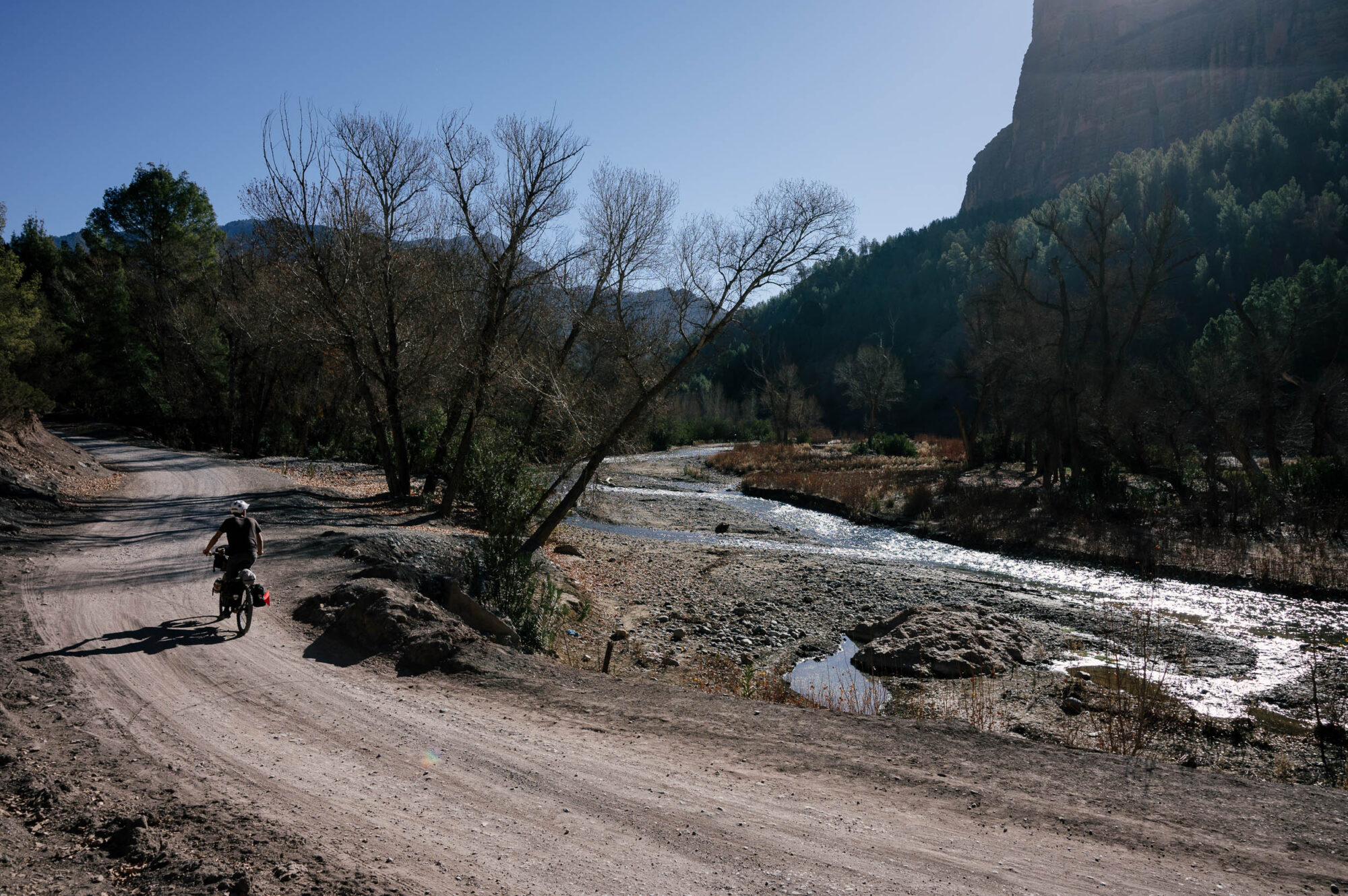
Riding over the final pass, descending into Ait Bou Ouli—sweeping left and right on the soft dirt roads, donkeys and their bundles of firewood, a dozen sheep streaming down the hillside—I wonder where bikepacking can fit into all this. The riding here is phenomenal, with high alpine dirt passes and long descents and canyons to explore and beautiful and kind people scattered throughout. I think there could be some incredible bikepacking routes built out here if only the police would leave the foreigners on bicycles alone. And for me, the bicycle is the best tool to connect to the Atlas.
Kids go everywhere by bicycle here, and the best experiences I’ve had in Morocco were because of bikes. Two families really adopted me and welcomed me into their homes, and we cooked together and gardened and played games and learned languages and went out dancing and shook and kissed all the hands. Those experiences that fill my heart, that make travel interesting, that make the world feel good again, those two families I met because the boys were out riding bikes, and we started riding bikes together, swapping mine for theirs, wheelie competitions and selfies and just chatting, and then they said, “Hey, come over to my house. We can have tea.” And I stayed for weeks. The bike is the easiest way I’ve found to bridge these huge swaths of differences. Here we are, both pedaling up this hill, both uncomfortable, both exposed. Let’s do this together. Let’s be friends.
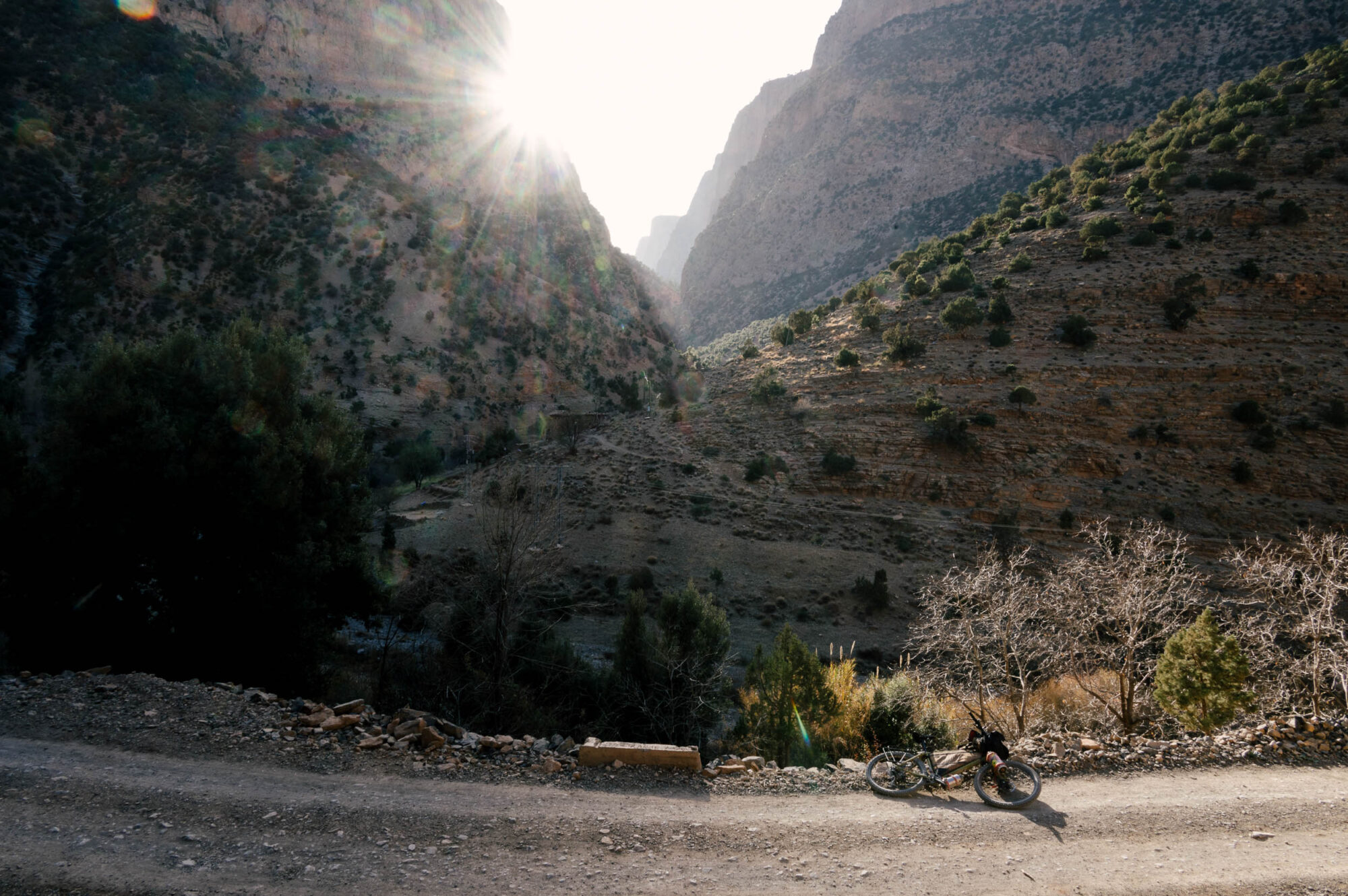
Just two days left now. Earbuds in, leaning into the music and riding it through the hard parts. Western Sahara desert blues lulling me into a trance; wooden sticks and chicken bones drumming on sardine cans and dried gourds, words I don’t understand, but a tempo I’m growing accustomed to. Long lazy sounds and piercing vocals, the wind whistling through the earbuds, the squeak of my top tube bag as my handlebars rock, my labored breath in the thin air. I ride on in a daze, my legs empty, my mind racing, just one set of photos left to give out. A flock of sheep, a growing wind, strong sun, frozen hands. I ride on under the shadow of M’goun, North Africa’s third-tallest mountain. I am small in its presence. The wind continues to whip, and for a brief while in this great valley, I feel completely alone.
I ride into Tagassalt and up to the final house about midday. A storm is arriving, and the kids are outside in the courtyard playing. They run up and greet me excitedly and sit on my handlebars. We ride into the courtyard together. The family comes out. Men and women and more kids. Some I don’t recognize. The bulk I do. “Evan!” they say, full of surprise. We shake hands and kiss cheeks and kiss hands, awkward hugs and endearing smiles. I told the family I would come back, but I don’t think they actually believed me, or maybe already a month late, they had given up. More smiles, laughter, disbelief. I pull out the photos and hand them over, of the family, of the boys, and the one of Marwa and her son. I think it’s the most beautiful photo I shot all trip. The two look off to the hills in tandem, the snow in the background, the soft morning light, and her silky yellow gown. “Zweena!” They shriek. “Zween bzef!” I reply. They pull me inside. Later, I will see to it that the photos are hung on the walls.
I unclip my helmet and put on my slippers. We go inside, and there are more people, and they’re shuffling through the photos, pointing and gawking and laughing. I arrive just as lunch is served, and they pull up a stool and tear off some bread for me, and they lift the lid of the tagine, and the words and the whispering slows, and the steam rises and swirls and fills the small clay room. Together, we tear into the food. Chicken and parsnips and carrots and squash and couscous and bread and olive oil. Buttermilk from a metal jug and tea off the fire. The wind blows stronger outside, but it’s warm here. I feel comfortable in the same brown room I know from before.

The women pass around the photos, and a teacher there speaks English. She explains the house dynamics I didn’t understand the first time. One husband, two wives, eight children, plus the other two women with their four children who also live here, and then the neighbors are here to eat; maybe more will come later. We’ll see. The father’s phone rings, cutting through the gentle stirring of the afternoon meal. He talks aggressively. He looks at me and smiles. He takes out his ID and sends a photo. “Police!” he says. “Already?!” I ask in reply. I had been there for just five minutes. They must have been watching. The teacher tears off another piece of bread and smiles. “That’s Morocco,” she says, winking with her smile, shoulders heavy with acceptance. And the call is over, the police go home, and we eat until there’s nothing left.
We sit around the small wooden table on the even smaller plastic stools, and we just talk. The kids ride my bike back and forth outside. The stove spits coals that sizzle in the spilled milk. Mud and straw and cement and plastic. The lone flickering bulb and the car battery in the corner. Night is here now, and the wind is blowing even stronger. No snow yet. None will come. I’ll sleep in the salon with the boys. I pull out the cards and quickly shuffle past the photo of the Atlas, of the black-and-white anguish. The photo so contradictory to this village bursting with color. They pause the card game for the final prayer of the day, and later they come back. The fire is warm, and another round of tea is served, and together, we play into the night.
Further Reading
Make sure to dig into these related articles for more info...
Please keep the conversation civil, constructive, and inclusive, or your comment will be removed.



